Made in Abyss: Gender Politics
The horror adventure series Made in Abyss–which began as a manga in 2013 and was later adapted into an anime–has been met with generally positive reception. The anime version in particular won Crunchyroll’s Anime of the Year award in 2017, 1 and has since been made into a two-part movie. 2 Currently, a second season is in the works, as in an OVA 3 The series follows the adventures of a young girl named Riko and her best friend, a robot-like being named Reg, as they journey into the Abyss, a great pit that lies at the center of their world. Riko intends to find her mother at the bottom of the Abyss, but unfortunately, nobody who has traveled that far down has ever made it back to tell the tale.
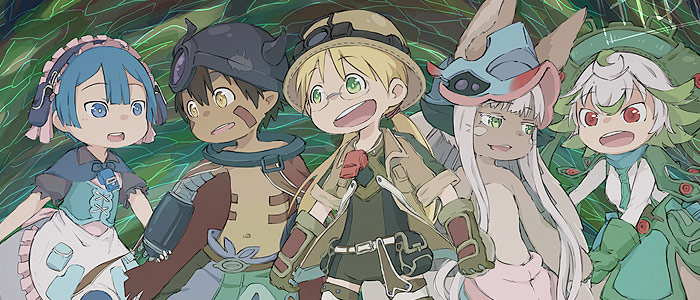
In the fandom, attempts to explain Made in Abyss‘s often confusing and disorienting world and plot–particularly the Abyss itself–are legion, and multiple interpretations persist, particularly since the series remains as yet unfinished. However, one of the more interesting and troubling features of Made in Abyss is its approach to gender. The Made in Abyss manga, for example, seems to be one of the few manga series to make extensive use of gender-neutral pronouns, in reference to the hollows–individuals who descended so far into the Abyss they lost their humanity–including the point-of-view character Nanachi. Fans also debate the relative merits of Riko as a feminist heroine, with some praising her bravery and intelligence 4 and others insisting she spends too much time as a damsel-in-distress whom Reg has to save. 5 To its credit, Made in Abyss does provide characters in a wide range of genders and roles. However, the actual story these characters tell ends up being surprisingly traditionalist, and even reactionary–to the point it often seems as though the series is trying to make the case against, rather than for, freedom of gender expression.
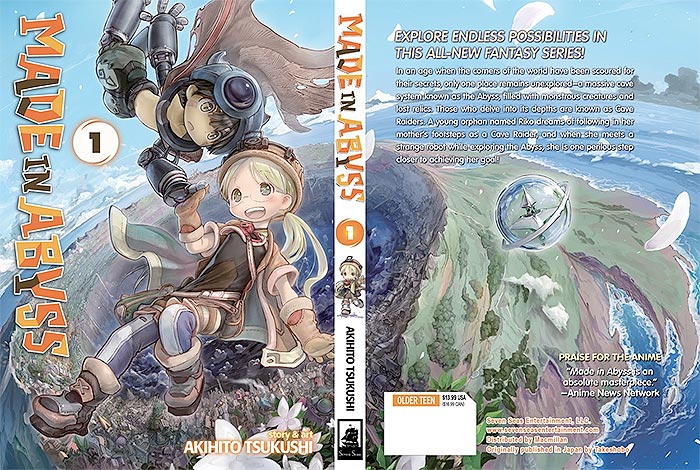
Of course, lots of anime feature attempts to play around with gender and the expectations attached to it, perhaps as a reaction against the quite strict gender roles that have dominated Japanese culture for most of its history. Many anime and manga–including really dark and violent series like Deadman Wonderland, Shiki, and Black Lagoon–portray attempts to transcend or blur these gender roles neutrally, as an inevitable fact of life; and some portray them positively. Still other series–Last Exile being among them–present female characters who seem to take on roles traditionally reserved for men, only to force them into the background in favor of their male coworkers, seemingly without realizing it. Made in Abyss does neither of these things, however. It is clear, for instance, that Riko matters just as much to the story as Reg, but she still can’t escape from the limitations of her sex, and neither can he. Made in Abyss may look good to a feminist at first, but under the surface lurks a deep well of sexism and gender essentialism which is all the more surprising in such a slick, modern series.
Through the Eyes Of a Child
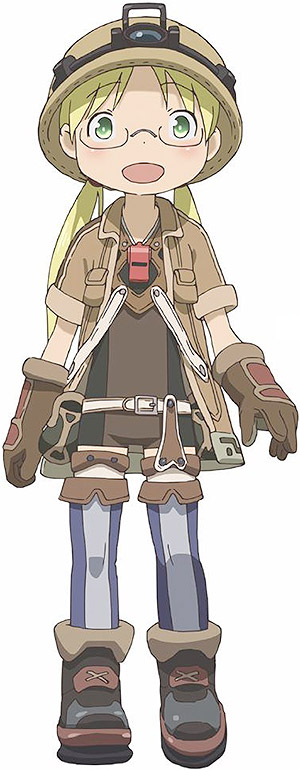
One of the more immediately troubling aspects of Made in Abyss lies in its willingness to show children get hurt–often in graphic detail and sometimes incorporating an element of sexual humiliation as well. For instance, in the world of Made in Abyss a common penalty for children who disobey orders is to be strung up naked and whipped. Riko in particular spends a distressingly large amount of time wearing little to no clothing. However, unlike in many series, this nudity does serve a narrative purpose: namely, illustrating that Riko has the body of a child. At the outset of the series she hasn’t reached puberty in any substantial way, and although she is officially twelve she could easily pass for nine or ten, as could Reg. This might be one reason why she feels comfortable sharing a bed with Reg and appearing undressed in front of him, even though she knows he has a full set of reproductive organs: she is simply too innocent to appreciate the sexual connotations of her actions.
At first glance, it might seem strange that a series so clearly aimed at mature audiences would feature such a youthful main cast. However, one of the most common arguments reactionaries make is that the adults who benefit from the current laissez-faire culture willfully ignore its negative impact on children 6. By taking the focus off of adults and revealing the world through the eyes of a child, Made in Abyss is able to give its audience a sense of its lead characters’ vulnerability and, by extension, the vulnerability of all children in a harsh world full of selfish adults. As apprentice Red Whistles at Belchero Orphanage, an institution that trains orphans to become cave-raiders who hunt for relics in the Abyss, Riko and her friends experience a semblance of order, camaraderie, and protection–they have sympathetic adults to watch over them and assign reasonable goals, and are not trusted to venture further than a couple hundred meters at a time into the Abyss–even as their everyday life is often harsh and difficult. However, even these imperfect protections fall away almost instantly once Riko and Reg decide to descend into the Abyss on their own.
Overview of Riko’s and Reg’s Characters
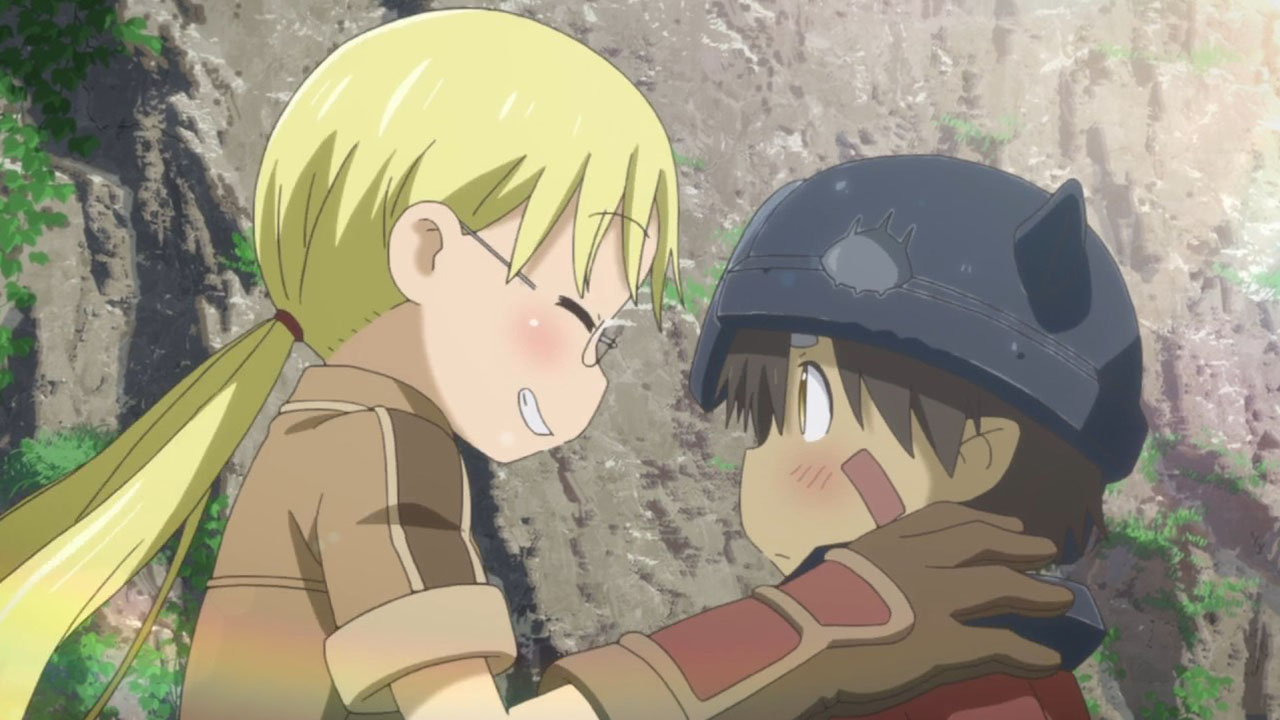
Riko and Reg are the two central characters in Made in Abyss, and in many respects they’re exact opposites. Riko, a young girl, is impulsive, easily excitable, and daring whereas Reg, a boy with robotic characteristics, is smarter, calmer, and more level-headed. This arrangement already shows a fairly serious departure from traditional gender roles in many famous anime, which generally pair up impulsive and hot-headed male leads who love to fight with calm, no-nonsense female costars who keep them on the straight and narrow.
However, in every other respect Riko and Reg settle into the roles expected of their respective genders fairly quickly and comfortably. It’s established early on, and repeated by every major character that the two of them come across, that Reg is meant to function as Riko’s bodyguard while on the trip, protecting her from danger so that she is free to search for her mother and collect relics. This expectation is so powerful that, in Episode Nine of the anime, Riko actually throws a weapon that she had been carrying to Reg so that he can kill a monster for her! Riko and Reg also divide up the tasks of everyday living in fairly traditional ways, with Reg fishing and hunting for meat which Riko cooks into delicious meals.
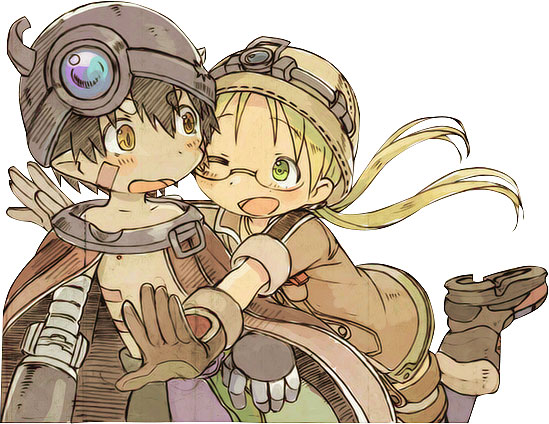
The series also goes out of its way to highlight Reg’s masculinity whenever it can. For instance, the characters he meets, whatever their age and relation to Reg, all seem fascinated by his penis. Reg himself notes early in the series that, if he is truly a robot as everyone says he is, he should not need such an organ at all. Since male sexual organs have long been a symbol of masculinity writ large, the series establishes firmly and early on that Reg is not only a boy, but a proper, strong, masculine boy–something which is consistently reinforced by his incredible strength, commitment to protecting Riko, and even his unique ability to be unaffected by the Curse of the Abyss. It’s probably no coincidence that, as he’s fighting the villain Bondrewd, the highest praise Bondrewd can muster for him is, “You really are a boy!” A popular refrain among conservatives is that men are simply naturally more risk-taking and aggressive than women, and the author of Made in Abyss would likely agree with this point.
It’s interesting to note, however, that the children both seem to pick up more stereotypically masculine characteristics as they descend further into the Abyss. For instance, whereas at the beginning of the series Riko has long, flowing blonde hair that reaches down to her waist, in Volume Seven of the manga she cuts most of it off and donates it to a friend in need. Meanwhile Reg, who is a gentleman in the early stages of the series, seems to become increasingly feral as the story progresses. By the time he meets Nanachi in the fourth layer of the Abyss, he’s picked up a habit of invading their personal space in a way that they find very creepy. They have no such problem with Riko, however, which implies that they feel threatened by the idea of a male presence getting into their face. The implication is that the Abyss is a place that on some level rewards masculinity.
Ozen and Lyza: Women Behaving Like Men
Riko’s mother Lyza, and her mentor Ozen, stand out as the two most prominent female White Whistles–that is, the most accomplished and celebrated type of cave-raider. What’s interesting is that each of them, in her own way, demonstrates a rejection of traditional femininity and female gender roles. This isn’t necessarily regarded as a good thing, however, and the implication is that both of them have an urge to act more feminine, albeit one they either deny or express in unusual ways.
Right from the start it’s clear that Lyza, who abandoned Riko in an orphanage when she was still a toddler, was no ordinary mother. For one thing, her full title as a White Whistle is Lyza the Annihilator–a decidedly unfeminine label. Jiruo, a young man who teaches cave-raiding at Belchero Orphanage, used to be Lyza’s apprentice. At a festival celebrating Lyza’s life and accomplishments, he describes her to Riko as “a heavy drinker who got into a lot of fights”–again highlighting her masculine qualities.
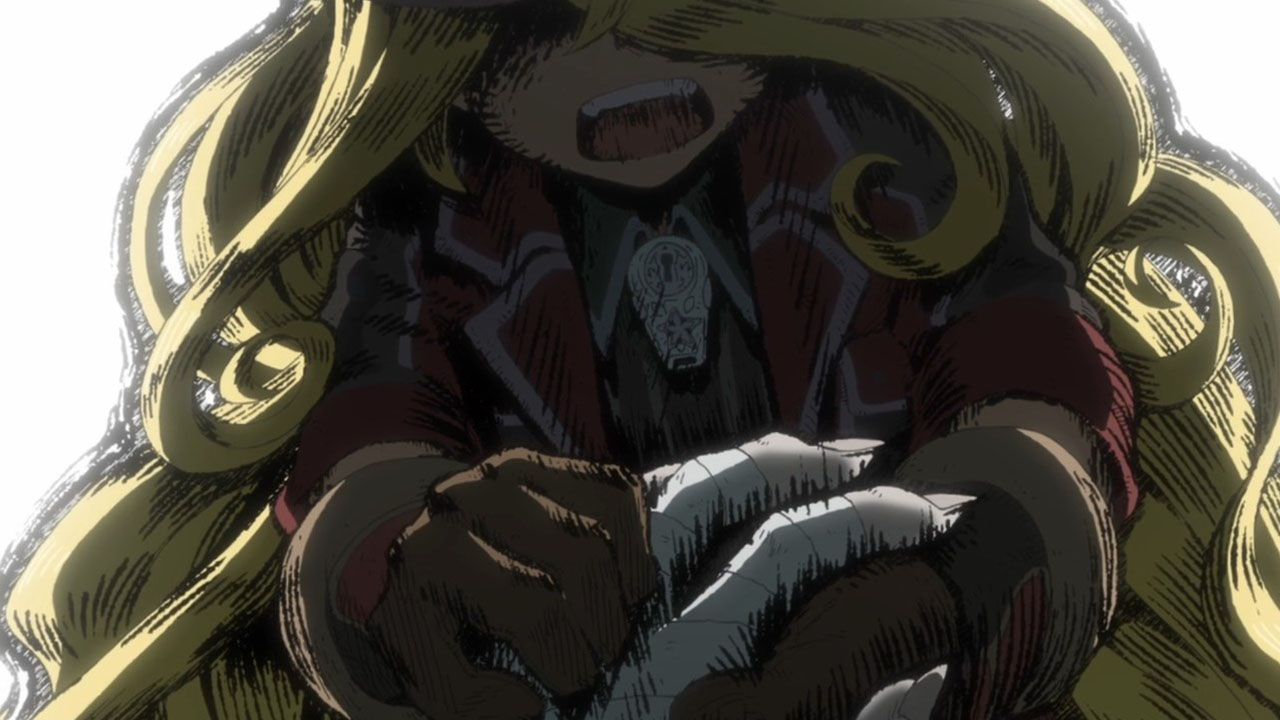
Lyza’s embrace of a typically-masculine demeanor and love of danger took a tragic turn when she was sent on a mission in the Abyss after becoming pregnant with Riko. During this mission, her husband died, and her daughter was stillborn, later to be revived by a special relic from the Abyss. It seems as though the authorities took Lyza’s love of cave-raiding and comfort in masculine roles at face value, and assumed that if a male cave-raider could drop everything to venture into the Abyss in search of a relic, so could she. Mary Eberstadt, a traditional Catholic writer, argues that this phenomenon occurs in real life too and drives the increasing prevalence of women in traditionally male-dominated careers.
The bedrock fact is that today’s women are continually given the message that they must perform like men–that men are the standard by which women should be measured. […] [W]omen who cannot, or do not, compete on male terms–sexually, athletically, professionally, or otherwise–are then trapped in the paradigm of being “failed men.” A successful woman these days is most often one who behaves most like a man, in the workplace and elsewhere, and what might be called a “beta woman” is one who does not. 7
What’s particularly telling is that, when Lyza eventually abandons Riko, she explains that if she stays with Riko she’ll be drawn away from the Abyss. She seems to be acknowledging that being a mother makes her more than just a cave-raider whether she likes it or not. She can’t seem to accept this new side of her identity, however, and so back to the Abyss she goes.
Similar to Lyza, Ozen exhibits a lot of traits seen most often in male anime characters. Her full title is Ozen the Unmovable, a reference to her immense physical strength which allows her to utterly thrash even the superhuman Reg in combat. However, Ozen was not always a strong as she is now–her power comes from a device called a Thousand-Men Wedge, which she inserted into the flesh of her arms. She also dresses in a fairly masculine style, wearing a waistcoat, pants, and a cape and keeping her hair short.
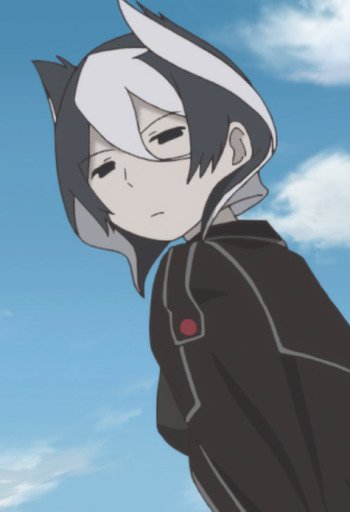
Ozen does have a softer side than she first appears to. For instance, she takes in and cares for a lost child named Marulk, whom she promoted to the Blue Whistle rank so that she could live with her in the Abyss’s second layer. She also gives Riko and Reg a place to sleep, and provides them with crucial advice and training that they can use later in their journey. Strangely, Ozen doesn’t seem to be entirely comfortable with this more benevolent side of herself. For instance, in flashbacks she casually mentions kicking and beating Lyza during the latter’s apprenticeship, and she also beats up Reg and taunts Riko by claiming that she had considered leaving her in the Abyss when she was a baby, seemingly without a care. The implication is that Ozen is ashamed of her maternal, nurturing instincts but is unable to brush them aside altogether. Ozen was also the only one who assisted Lyza in giving birth to Riko, although she grumbled about it and blamed her own involvement on being “cursed with a strong sense of duty.” It’s as if she’s echoing Mary Eberstadt’s observation:
If men cannot, or will not, be found to help protect women (and children), to whom does that task fall? The answer would seem to be, a woman–a woman who’s being more like a man, that is. 8
Who is Marulk?
Marulk is Ozen’s assistant and ward, about Riko’s age, who lives with her at the seeker camp in the second layer of the Abyss. Outwardly, Marulk seems to be one of the more feminine of the series’ characters. However, the series gently implies that she is transgender–soon after Reg meets her he asks her if she’s a boy or a girl, causing her to become clearly embarrassed. The series has yet to spell out how or why she got lost in the Abyss in the first place, but one possibility is that she was trying to escape from other kids who might have teased her about her gender identity.
Although Marulk is a sympathetic and likable character, she does not lead an especially happy or easy life. Ozen takes good care of her overall, but sees nothing wrong with stringing her up naked and whipping her if she’s displeased. She can also never return to the surface, but will seemingly be forced to remain in the Abyss for the rest of her life. Furthermore, if indeed she is trans, it’s quite likely that she will eventually go through male-typical puberty. When that day comes, what will she do? Will she come to terms with having a body that looks visibly male? Or, will she attempt to find a way of changing her body into something she desires, even if it means descending further into the Abyss?
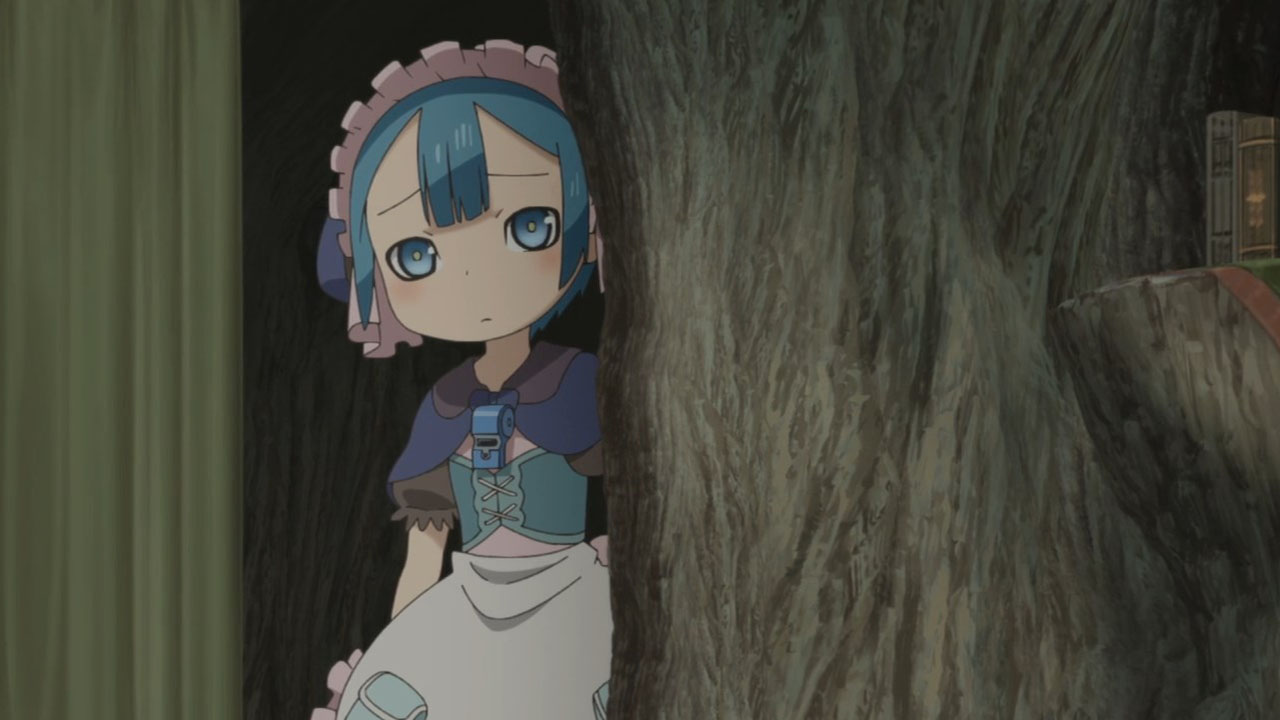
Nanachi’s Gender Confusion
In the fourth layer of the Abyss, Riko and Reg meet a strange rabbit-like creature named Nanachi. Nanachi is a hollow–a type of creature that lost their humanity by traveling through the Sixth Layer of the Abyss. Nanachi, at least, retains the ability to speak and some semblance of a human form, but their best friend Mitty has seemingly lost all trace of humanity and ability to interact with the outside world.
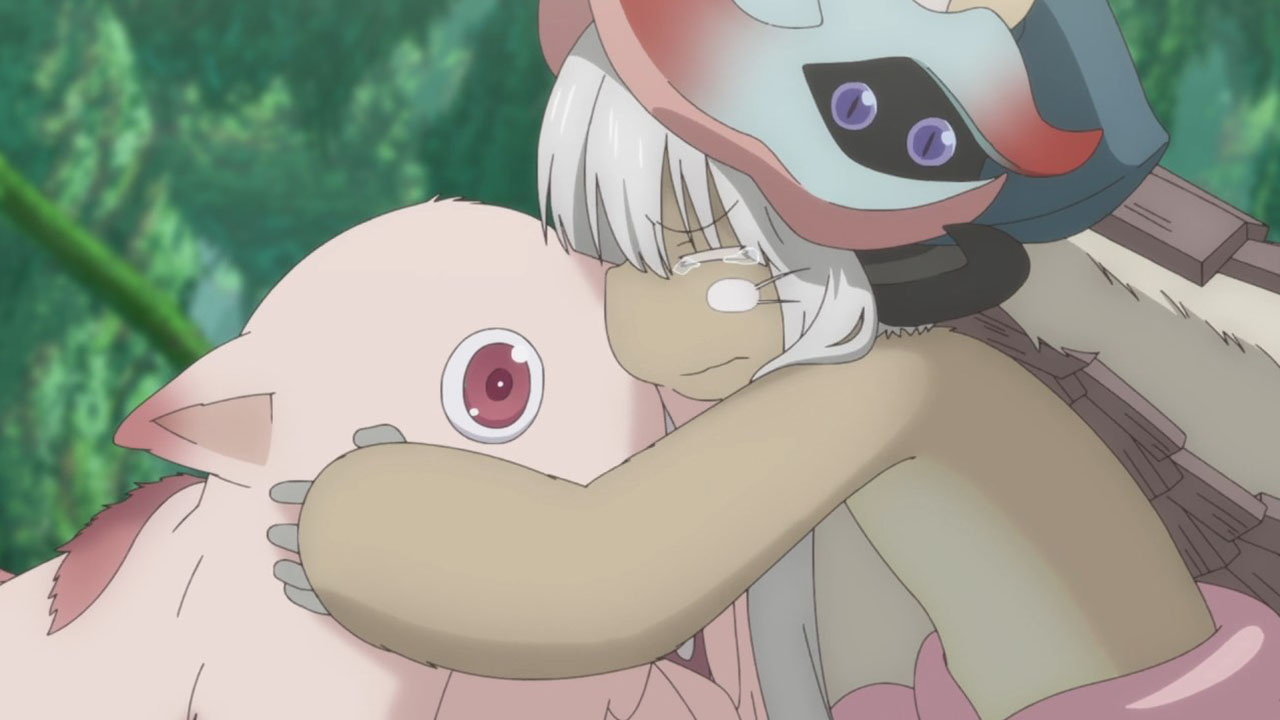
One of the most puzzling aspects of Nanachi’s character is their apparent lack of gender. The manga in particular always refers to Nanachi using gender-neutral pronouns, a trend that continues later in the manga with many of the hollows who live in the Sixth Layer full-time. In the brief glimpses that the audience gets of Nanachi’s human form, they seem to lack any traces of secondary sexual characteristics, and even the author of the manga has stated that he intends to leave Nanachi’s true gender up to the audience to decide. 9 This ambiguity hasn’t stopped people from speculating, however. Most fans–and the English dub scriptwriters–just assume that Nanachi is a girl (there is a collection of short videos on YouTube titled “Nanachi is a boy,” but those seem to be satirical 10).
Based on the available evidence, the overwhelming likelihood is that Nanachi is indeed a girl–or at least, was born a girl. Anecdotally, most of the people who identify as nonbinary or genderqueer seem to have been born female, and decided that they didn’t identify with being female later in life. In Nanachi’s case, the reason why they might not choose to identify as female is obvious: they don’t really know what it means to be a “girl” or “woman” in the first place. For example, Nanachi clearly has an interest in some classically female duties, like cooking and healing. However, while they effectively heal Riko when she’s poisoned and suffering internal bleeding, they can’t cook. When Reg confronts them on this, they protest that they’ve never known food that tastes good–before going into the Abyss, they lived on the streets and scavenged all their meals from the garbage. The clothing that they wear doesn’t look especially feminine either, but then, they’ve never had the time, money, or will to acquire dresses or other typically “ladylike” clothing, which wouldn’t be practical in the Abyss anyway (by contrast, Riko does wear a dress–albeit a fairly shabby one–while in Belchero Orphanage).
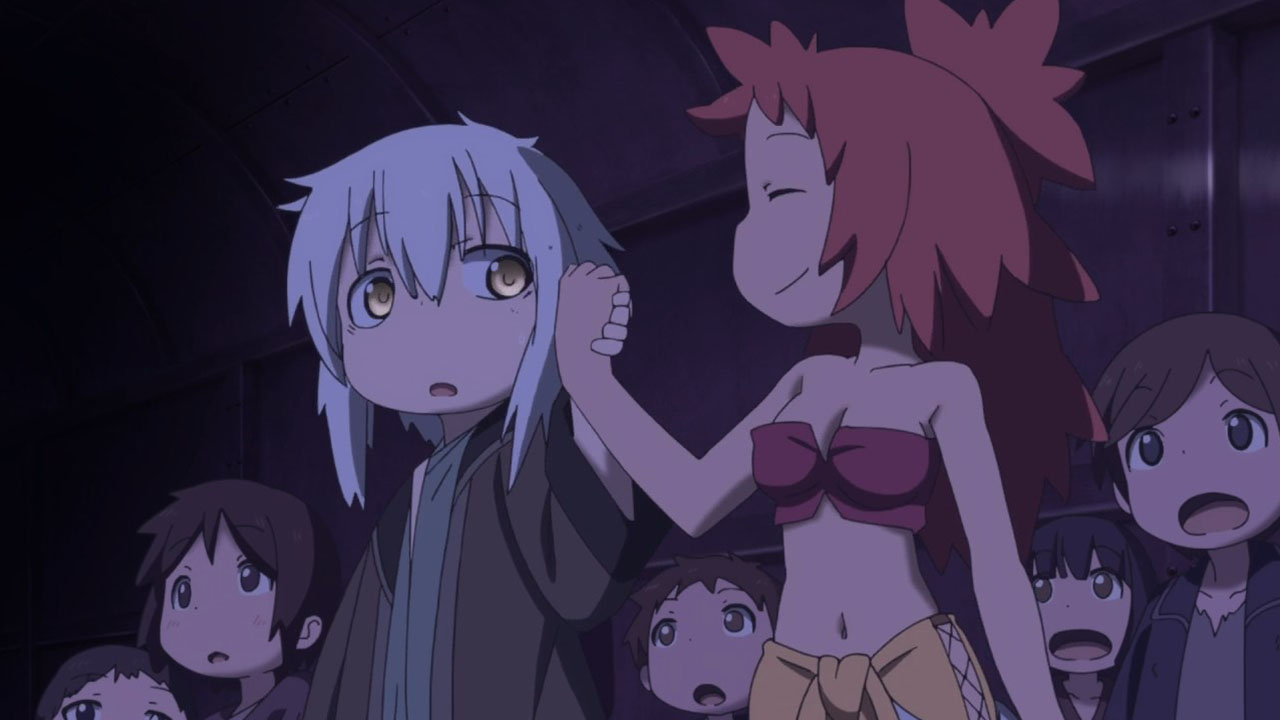
Furthermore, based on Nanachi’s interactions with Mitty, it’s likely that they had romantic feelings for her. This could have caused some confusion as well, particularly if Nanachi’s only model of romantic relationships involved a boy and a girl. They might well have thought that, to have romantic yearnings for a girl, they must really be a boy deep down, rather than recognizing themselves as a gay girl.

Regardless, it’s clear that Nanachi isn’t empowered by their lack of defined gender. Instead, they’re vulnerable and confused. As social commentators from Simone de Beuvoir on have pointed out, nobody is born knowing how to be masculine or feminine. 11 Young people need trustworthy adults–something Nanachi and Mitty conspicuously lack–to teach them their place in the world and explain the nuances of gender to them.
The True Mission of Bondrewd
One of the series’ first major villains, Bondrewd is a White Whistle who lives in a base called Ido Front, at the bottom of the Abyss’s Fifth Layer. He was the one who transformed Nanachi and Mitty into hollows while attempting to test the limits of the Curse of the Sixth Layer. He also dismembers and chops up children in order to turn them into cartridges, which have some ability to repel the Curse of the Abyss when worn.
A common refrain among social conservatives is that transgender activists want to abuse children by “turning them trans.” Although Bondrewd doesn’t actually encourage the children to identify as transgender or perform sex-reassignment surgery, he still destroys their bodies and lives for his own self-protection and self-aggrandizement, just as many reactionaries argue trans activists do. These reactionaries often bring up the steps of medical gender affirmation, which on paper can seem pretty awful. 12 In order to medically transition to a different gender, a patient undergoes a lifetime of hormone supplements 13 coupled with plastic surgery that may last for hours and entail weeks of recovery, 14 and which can lead to serious complications. 15 Youth who transition before puberty may also be given puberty blockers. 16 Though such a procedure may reduce anxiety surrounding puberty in the short term, it makes later surgeries more difficult since plastic surgeons are used to operating on mature adults. 17 For this reason, even people who support medical transition in fully-grown adults often object to the transition of minor children. 18
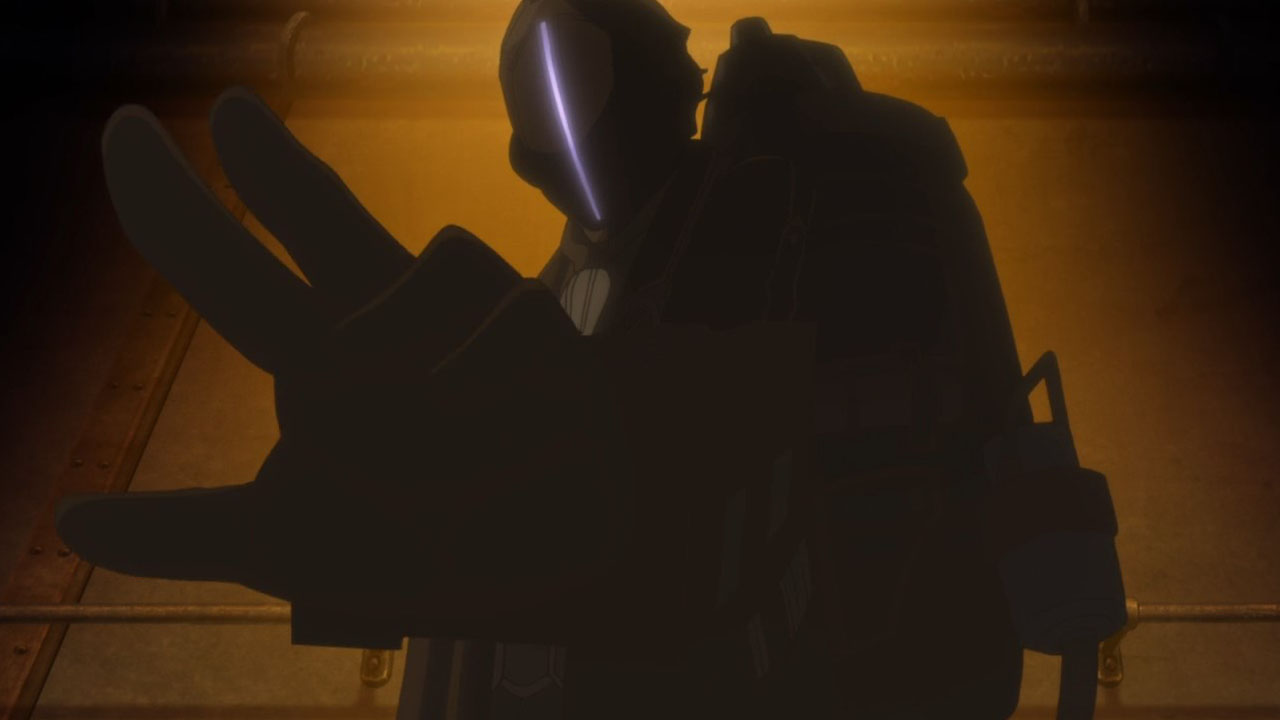
On the surface, as the friendly cave-raider Habo explains to Riko’s friends, Bondrewd is chiefly known not for his experiments on children but for his attempts to clear away predators and obstacles down in the Abyss. Though these activities may seem unrelated, what unites them is a desire to cheat or circumvent nature. He even admits openly that this is his ultimate goal, as when he tells Nanachi and Mitty: “The Curse of the Sixth Layer is death–or loss of humanity–and I intend to do something about that.” Interestingly enough, Bondrewd never forces Nanachi or Mitty to be test subjects–they, along with many other children, freely agree to follow Bondrewd into the Abyss to help him with his research, not realizing what they’re getting themselves into. He also seems to care for at least some of the children, particularly Nanachi, in his own way, as is shown in a flashback where he says to Nanachi, “I wish you’d look happier.” Even after Nanachi steals Mitty away from him and orchestrates her death, he still welcomes them back with open arms and asks them to work for him again. More often than not, Bondrewd seems less malicious than oblivious, forging ahead in his goals without knowing or caring about the pain he inflicts on others.
Bondrewd as Wicked Stepfather
Many of the same reactionaries that oppose transgenderism also insist that, more often than not, children fare best when raised by their biological parents. They generally cite studies showing that children missing at least one biological parent are more likely to suffer abuse. 19 One organization in particular, Them Before Us, holds that society owes children the opportunity to grow up with their biological families whenever possible and practical. This organization argues that institutions like gay adoption, in-vitro fertilization, and surrogacy turn children into commodities to be bought or sold. 20
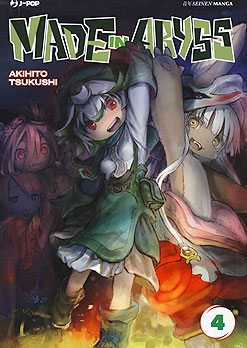
At Ido Front, Riko and her friends meet a young girl named Prushka, who introduces herself as Bondrewd’s daughter. When Nanachi confronts Bondrewd about this later, he admits that Prushka is not his biological daughter, but insists that it doesn’t matter because the only thing that should define familial relationships is love. Considering the nobility and idealism of this statement, and how closely it tracks with arguments used to bolster non-traditional families, it’s interesting that a villain is the one making the argument.
The problem is that when it comes to Prushka, Bondrewd doesn’t practice what he preaches. He claims to love her, but in the end he turns her into just another one of his cartridges, ultimately precipitating her death. As he’s getting ready to have her disemboweled and chopped up, he lovingly reaches out to her on the operating table and promises that they’ll be together forever, as if the entire situation were perfectly normal. It’s reminiscent of the surgery scenes in the I Am Jazz reality series, which show the titular Jazz being wheeled cheerfully into a hospital and her parents and siblings wishing her well, the way they would if she were doing something as commonplace as getting an appendix removed or giving birth. 21
Some traditionalists argue that parents who want to look woke will attempt to burnish their credentials with LGBT activists by pushing their children to identify as transgender. This argument came to a head when a divorcing Texas couple went to court following a disagreement about the gender of their seven-year-old child. 22 When word of the case reached conservative Twitter, it caused an uproar, with one Christian firebrand named Matt Walsh creating the hashtag #ProtectJamesYounger to raise awareness of what he saw as an attempt to manipulate and abuse the child. 23 Not long afterward, Katy Faust, the founder of Them Before Us, attempted to connect the case to the alleged unreliability of non-biological caregivers. She claimed:
Unfortunately for little James, the adaptation he had to make [to his parents’ divorce] went far beyond meat-lover’s pizza at his dad’s house and cauliflower crusts at mom’s: it meant losing one of the most sacred aspects of his identity–his maleness. […] [O]ne of the two parents engaged in this custodial tug-of-war isn’t biologically related to little James. Care to guess which one? Do you think it’s the parent who wants to keep him physically whole? It’s not. 24
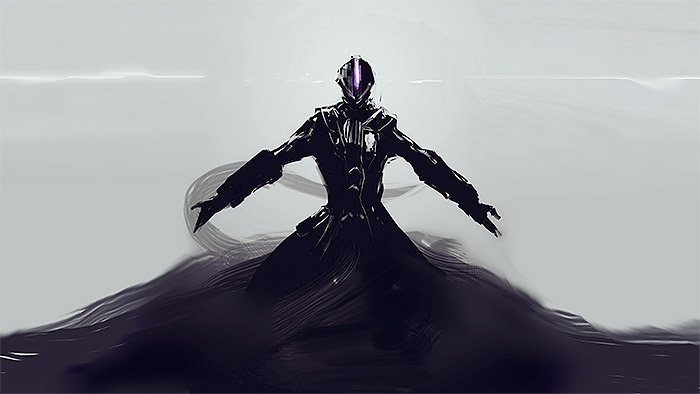
To make matters worse, Bondrewd’s mistreatment of Prushka likely extends beyond his interest in using her in deadly experiments. At one point in the manga, as Riko attempts to explain the concept of a penis to Prushka, the latter admits that she’s always known it as a “papa pole.” The fact that she would associate a penis so closely with Bondrewd suggests that he has sexually abused her in the past–a suggestion reinforced by a piece of art at the end of Volume 4 showing Prushka in sexually-compromising positions. As Mary Eberstadt points out, “In essence, the fastest way to raise a child’s risk of sexual abuse is to take one or both biological parents out of the home.” 25 All in all, what Made in Abyss seems to be saying is that despite Bondrewd’s protestations he does not, and cannot, love or care for Prushka the way her biological parents could. All he can do is hurt and exploit her, whether he wants to or not and whether she’s aware of it or not.
The Hollow City in the Sixth Layer
Upon reaching the Sixth Layer of the Abyss, Riko and her friends come upon a city populated almost entirely by hollows like Nanachi. Like Nanachi, most of the hollows in the city lack defined gender. Instead, as one friendly hollow named Kaja explains, they construct bodies for themselves based on their personal desires–that is, their erotic leanings. The hollows also use body parts–and sometimes entire bodies–as currency to barter and trade for goods, thus rendering mutilation a fact of life.
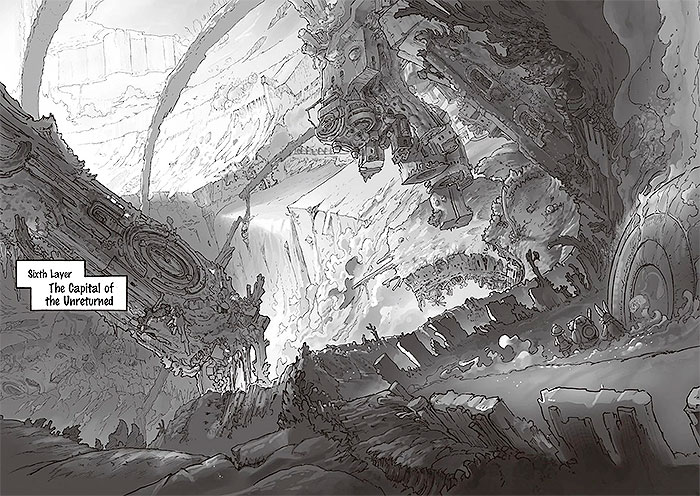
The notion of seeking a body in line with one’s own desires sounds eerily similar to the concept of autogynephilia. According to some researchers of human sexuality, some trans women were once men who developed autogynephilia–a sexual preoccupation with the idea of themselves as beautiful women. Subsequently, they decided that they had no other choice than to start dressing and living as women. 26 Is the author of Made in Abyss claiming that such individuals are wretched, inhuman monsters like the hollows?
Riko’s Broken Home
Riko comes from a broken family too, albeit not quite as extreme of one as Nanachi or Prushka. When she was just two years old, her mother abandoned her to explore in the Abyss, leaving her to grow up in an orphanage surrounded by unrelated kids–a situation Mary Eberstadt refers to somewhat disparagingly as a “forced pack.” 27 Although Riko seems to be a happy girl, it’s clear she’s troubled by her lack of family ties. She’s so desperate to see her mother that, when a note surfaces suggesting that Lyza is waiting for her at the bottom of the Abyss, she immediately takes the note at face value and makes plans to go and find her, even though she’s still just a Red Whistle who has never ventured further than a couple hundred meters into the Abyss before. Even when Ozen points out to Riko that the note does not use Lyza’s handwriting, Riko still is not dissuaded.
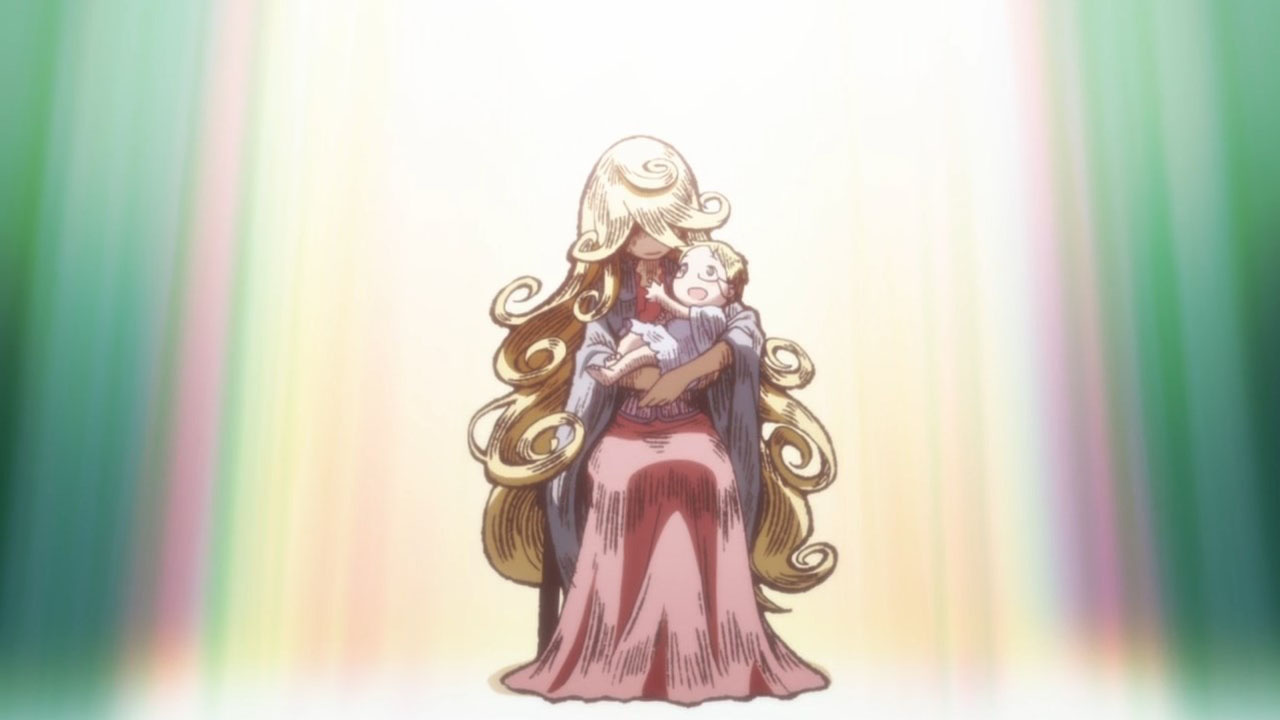
Riko’s longing for her mother is portrayed most vividly in Episode 9 of the anime. While the kids are exploring the Third Layer, Reg ends up unconscious, and Riko has to carry him through a vast network of tunnels in the rock. As she starts ascending to the edge of the tunnel, she begins to hallucinate images of her friends, telling her to give up. At first she’s able to dismiss the hallucinations, but she falters when she sees what appears to be her mother waiting for her at the top of the tunnel. When she tries to take her mother’s hand, she triggers a more all-encompassing hallucination in which she and her mother return to the surface of the Abyss together. She only sees through it when she realizes that Reg isn’t there, and she can’t leave him behind. At one point in the hallucination she even refers to her mother using the childish word “Mommy.”
Though the series never explicitly states that Lyza should have given up cave-raiding and settled down to a life of baking pot pies and volunteering at the local community garden in Orth, she still comes across as a fairly selfish and thoughtless individual who believed that risking her life in the Abyss was more important than caring for her only child. Ultimately, Lyza is responsible for all the problems Riko faces. She’s responsible for Riko being born in the Abyss, and for her growing up in Belchero Orphanage, an institution whose explicit purpose is to turn children into cave-raiders. Lyza attempts to justify her decision by claiming that she’s giving Riko the maximum freedom to choose her own path. However, in the eyes of many social conservatives, standing aside passively and allowing one’s child to choose whatever path they want constitutes a dereliction of parental duty. How, these people ask, is a child supposed to learn how to be a good citizen if not from their parents? 28
The Complicity of “Responsible” Adults
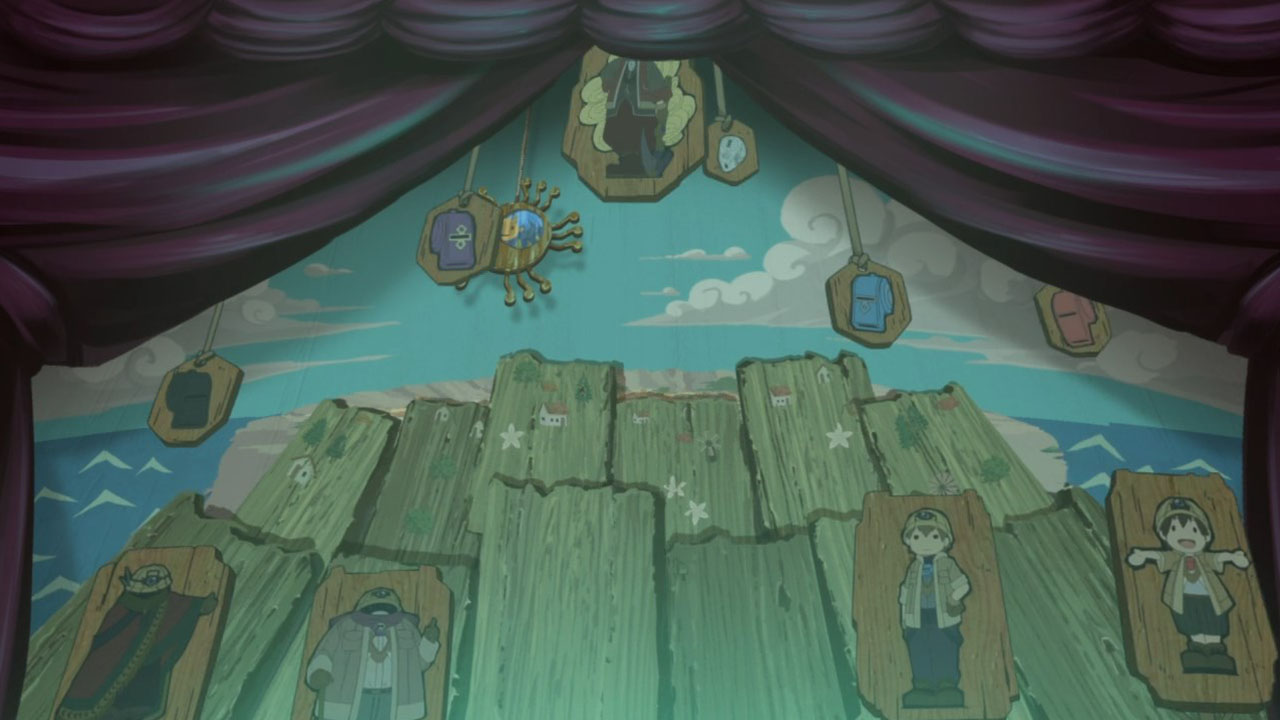
What’s arguably more worrying than the behavior of characters like Bondrewd is the way in which the wider culture permits, and even tacitly endorses, this exact behavior. The supposedly well-meaning adults around Riko and Reg both seem to want the same thing as Bondrewd wants: an endless supply of young people ready and willing to enter the Abyss and risk their lives to expose its secrets. The only difference is that while Bondrewd wants to take them into the deepest depths right away, the “responsible” teachers and trainers at Belchero Orphanage want to build them up to it gradually, introducing them to cave-raiding at approximately the age of twelve with the idea that they’ll be competent enough to advance to the proficient Blue Whistle rank by their mid-teens. The director of the orphanage explicitly tells the children who live there that becoming cave-raiders is the proper way to honor the memory of their dead parents, whom, it’s safe to assume, were all cave-raiders themselves.
Riko’s teachers and mentors don’t seem terribly interested in enforcing their own rules, either. When Riko and Reg sneak out of the orphanage to start their one-way descent into the Abyss, Jiruo makes a half-hearted attempt to come after them, but Riko assumes, seemingly correctly, that it’s a test to prove their worthiness. Later, the two friends run into Habo, and he too makes no effort to bring them back to the surface. The most he does is offer to escort them to Ozen’s seeker camp in the Second Layer, but when Riko refuses his help he lets her go without any protest or hesitation whatsoever. Riko is still only a Red Whistle, and has never been trusted to descend beyond the First Layer before, and yet neither of these adults seems willing to take on the responsible adult role of bringing her back home to safety. So far all the adults that Riko meets–Jiruo, Habo, and Ozen–have lied to her or withheld important details about who her mother was and what she stood for.
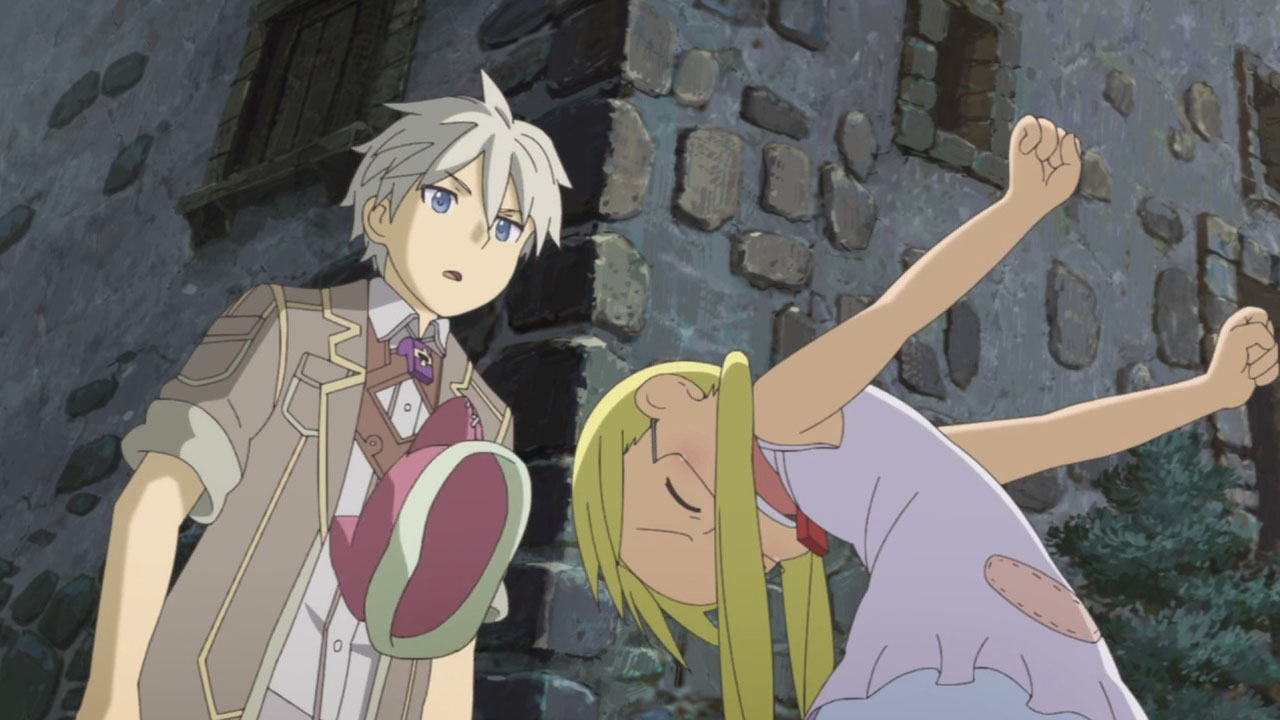
Furthermore, while these same adults know that something is wrong with Bondrewd–to the point that Ozen calls him “an out-and-out reckless scoundrel”–they never do anything to stop his evil experiments. At one point in a flashback, a cave-raider comes to chastise Bondrewd for bringing children so deep into the Abyss. Still, there’s nothing this cave-raider can do besides remind Bondrewd that he’s behaving unethically. Meanwhile, surface-dwellers continue to treat him and the other White Whistles as heroes. It seem as though they’re willing to sacrifice the lives and futures of countless children to uphold the fiction of White Whistles’ bravery and heroism. This, by the way, is exactly how reactionaries view the wider culture surrounding LGBT activism, and trans activism in particular. In their view, these activists–and their supporters in government and the media–are so wedded to the idea that trans individuals are born that way that there’s essentially no support for any solution to gender confusion in young people that doesn’t involve social and medical transition. 29
Is the Abyss Really So Alluring?
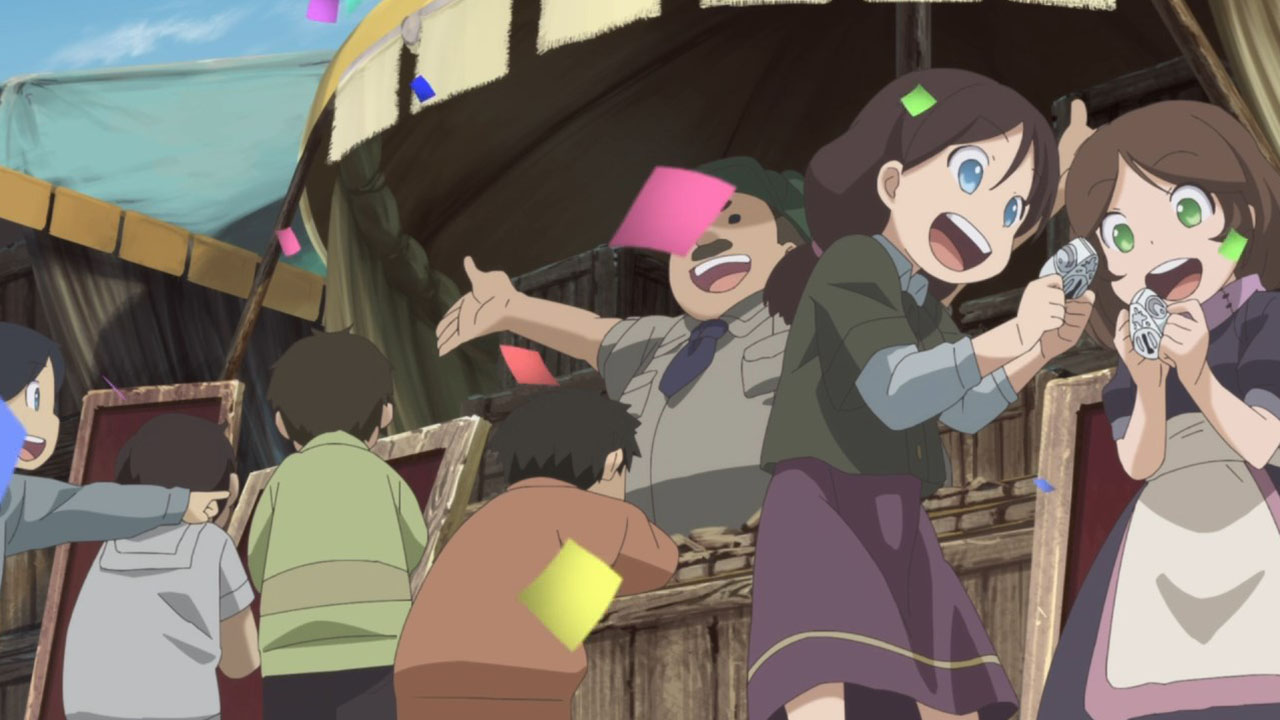
Ultimately it’s hard to tell how much of the Abyss’s allure is due to the Abyss itself, and how much is due to a culture that promotes cave-raiding as the most prestigious occupation and being a White Whistle as the highest end one can aspire to. Even in Orth, not everyone wants to be a White Whistle. Habo’s wife Auntie–who, incidentally, is one of the more feminine women in the series–even goes so far as to wonder, “Would being [a White Whistle] really be all that great?”
Undoubtedly, at least some of the attraction to the Abyss is real. Still, everybody knows that the Abyss is dangerous, and another kind of culture might train its citizens to resist the Abyss’s pull and get on with their lives. Instead, the citizens of Orth learn that anyone who wishes to go into the Abyss should and, eventually, will.
In this regard, as well, the series echoes the complaints of conservatives, particularly in religious organizations, who oppose LGBT activism. These people often argue that, despite the protests of gay activists, there is nothing inevitable about a gay person acting on their sexual preferences. Instead, they exhort gay people to ignore these preferences and establish a traditional nuclear family anyway, even going so far as to claim that such a decision will make them better off in the long run. 30 Dr. Paul McHugh, of Johns Hopkins University, has similarly argued that gender dysphoria is a purely psychological problem, and that instead of pursuing surgery trans people should be taught to come to terms with their natal sex. On the subject of Caitlyn Jenner, for example, he has said:
[Jenner] could have been treated for this misaligned arousal with therapy and medication. Instead, he found his way to surgeons who worked him over as he wished. 31
By this logic, Orth’s wholesale embrace of the Abyss functions similarly to events such as gay pride parades, which promote the LGBT lifestyle. Daniel Patrick Moynihan, a writer and former politician, described a phenomenon he called “defining deviancy down,” whereby something previously considered abnormal and in need of fixing becomes accepted as a normal part of life. Interestingly, the “deviancy” that Moynihan himself seemed most concerned about was the increase in broken families. 32
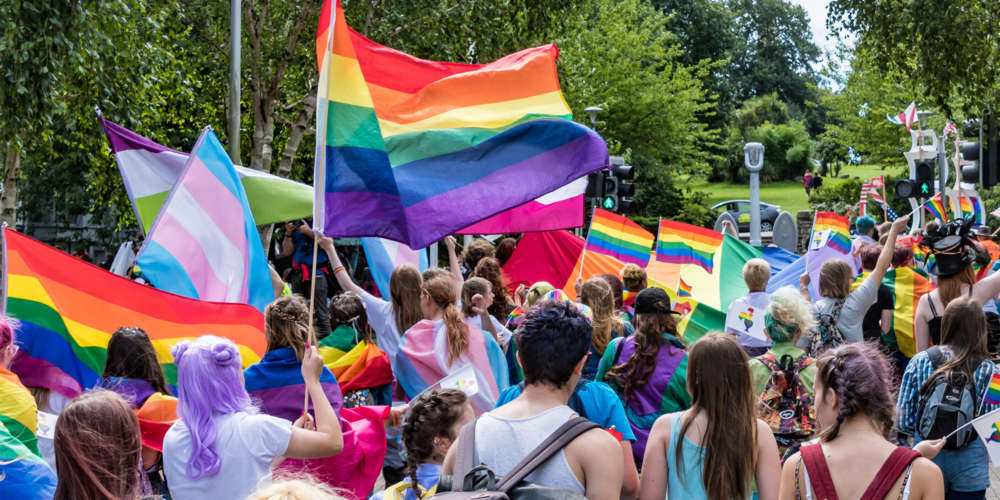
Most horror stories are rooted in a real problem that has been blown up to its most horrifying extreme, and Made in Abyss is no exception. Following its plot line and characters, more often than not, feels a lot like reading the lamentations of a gender-essentialist social conservative, overlaid with Lovecraftian horror themes. Of course, since Made in Abyss is still nowhere near completion, the series still has time to subvert or challenge this viewpoint. In the meantime, LGBT activists ought to take note.
It’s easy to dismiss people who rail against pro-LGBT activism and politics as irrational, bigoted bullies. However, these people see their views as perfectly rational and justified. The only way to convince them that they are wrong is to understand and offer direct rebuttals of the arguments they make. To get a sense of those arguments, one can do a lot worse than reading or watching Made in Abyss.
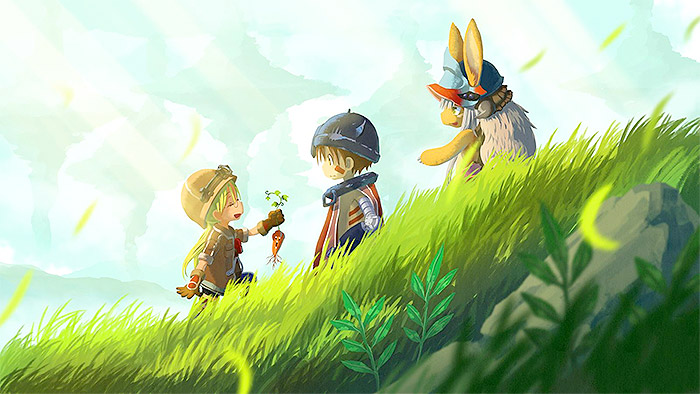
Works Cited
- Loveridge, Lynzee. “Made In Abyss, My Hero Academia Win Big At Crunchyroll’s Anime Awards.” Anime News Network, 25 Feb. 2018. Retrieved from https://www.animenewsnetwork.com/interest/2018-02-25/made-in-abyss-my-hero-academia-win-big-at-crunchyroll-anime-awards/.128238 ↩
- Howard, Courtney. “Made in Abyss: Journey’s Dawn.” Variety, 20 Mar, 2019. Retrieved from https://variety.com/2019/film/reviews/made-in-abyss-journeys-dawn-review-1203166567/ ↩
- Frye, Patrick. “Made In Abyss Season 2 release date: Sequel confirmed in 2020 by Bondrewd Dawn of the Deep Soul movie end credits – Made In Abyss manga compared to the anime.[Spoilers]”. Monsters & Critics, 2 March 2020. Retrieved from https://www.monstersandcritics.com/anime/made-in-abyss-season-2-release-date-bondrewd-dawn-of-the-deep-soul-movie-2020-ova-episode-confirmed-made-in-abyss-english-dub-manga-spoilers/ ↩
- “[Five] In defense of Riko (Made in Abyss).” Atelier Emily, 23 Dec. 2017. Retrieved from https://formeinfullbloom.wordpress.com/2017/12/23/five-in-defense-of-riko-made-in-abyss/ ↩
- Kaiser, Vrai. “Who’s the Hero, Anyway? Made in Abyss, gendered tropes, and damaging narratives.” Anime Feminist, 22 Sep. 2017. Retrieved from https://www.animefeminist.com/made-abyss-furthering-damaging-narratives/ ↩
- Eberstadt, Mary. Home Alone America. New York, NY, Penguin Group, Inc, 2004 ↩
- Eberstadt, Mary. Primal Screams. Conshohocken, PA, Templeton Press, 2019. pp. 84 ↩
- Eberstadt, Mary. Primal Screams. Conshohocken, PA, Templeton Press, 2019. pp. 82-83 ↩
- @tsukushiA et al. “Thank you! The gender of Nanachi is unknown….” Twitter, 16 Sep 2017. Retrieved from https://twitter.com/tukushiA/status/908953776102432768 ↩
- “Nanachi is a boy (Part 1)”. YouTube, DoggSticc, 31 Dec 2018. Retrieved from https://www.youtube.com/watch?v=3ZogBOrk47w ↩
- Sax, Leonard. “The Male/Female Mistake.” Why Gender Matters. New York, NY, Harmony Books, 2017 ↩
- Francis, Babette & John Ballantyne. “Where Angels Fear to Tread: The Fraud of Transgenderism.” The Public Discourse, 14 Nov. 2018. Retrieved from https://www.thepublicdiscourse.com/2018/11/42698/ ↩
- Unger, Cecile A. “Hormone therapy for transgender patients.” Translational Andrology and Urology, vol. 5 no. 6, 2016, pp. 877-884. Retrieved from https://www.ncbi.nlm.nih.gov/pmc/articles/PMC5182227/ ↩
- Larowe, Erin. What to Expect: Vaginoplasty at the University of Michigan Health System. University of Michigan Health System, 2016. Retrieved from http://www.med.umich.edu/pdf/Vaginoplasty.pdf ↩
- Ennis, Dawn. “‘This Is So Hard: Coping with Confirmation Surgery.” GO Mag, 9 Mar. 2017. Retrieved from http://gomag.com/article/hard-coping-complications-gender-affirmation-surgery/ ↩
- Seattle Children’s Hospital. Puberty Blockers. Seattle Children’s Hospital, 2019. Retrieved from https://www.seattlechildrens.org/pdf/PE2572.pdf ↩
- “Bottom Surgery | I Am Jazz.” YouTube, tlc uk. 17 Aug. 2017. Retrieved from https://www.youtube.com/watch?v=lG-U8oFpa8o ↩
- Sax, Leonard. “Intersex and Transgender.” Why Gender Matters. New York, NY, Harmony Books, 2017 ↩
- Faust, Katy. “Biology Matters.” Them Before Us, 6 May 2017. Retrieved from https://thembeforeus.com/biology-matters/ ↩
- Them Before Us. Them Before Us, 2020. Retrieved from https://thembeforeus.com/ ↩
- “Jazz Prepares For Her Life Changing Bottom Surgery | I Am Jazz.” YouTube, tlc uk. 2 Feb. 2019. Retrieved from https://www.youtube.com/watch?v=MLxkykG1R88 ↩
- Friend, Daniel. “Hearing in Custody Battle Over Alleged Transgender Seven-Year-Old Will Resume Next Week.” The Texan, 18 Oct, 2019. Retrieved from https://thetexan.news/dallas-custody-battle-over-alleged-transgender-seven-year-old-will-resume-next-week/ ↩
- @MattWalshBlog (Matt Walsh) et al. “James Younger is a seven year old boy being forced by his lunatic mother and a tyrannical court to ‘transition’ into a girl…” Twitter, 22 Oct 2019. Retrieved from https://twitter.com/MattWalshBlog/status/1186666523114528769 ↩
- Faust, Katy. “Why It’s Probably Not A Coincidence That The Mother Transing Her 7-Year-Old Isn’t Biologically Related.” The Federalist, 24 October, 2019. Retrieved from https://thefederalist.com/2019/10/24/why-its-probably-not-a-coincidence-that-the-mother-transing-her-7-year-old-isnt-biologically-related/ ↩
- Eberstadt, Mary. Home Alone America. New York, NY. Penguin Group Inc., 2004, pp. 136 ↩
- Perry, Louise. “What Is Autogynephilia? An Interview with Dr. Ray Blanchard.” Quillette, 6 Nov. 2019. Retrieved from https://quillette.com/2019/11/06/what-is-autogynephilia-an-interview-with-dr-ray-blanchard/ ↩
- Eberstadt, Mary. “The Myth of the Lone Wolf.” Primal Screams. Conshohocken, PA, Templeton Press, 2019 ↩
- @LilaGraceRose (Lila Rose) et al. “If you follow this advice, you’re abdicating your core responsibility as a parent….” Twitter, 10 Jan 2020. Retrieved from https://twitter.com/LilaGraceRose/status/1215733282156892161 ↩
- Cleveland, Margot. “LGBT Activists Teaching Judges To Yank Kids From Parents who Won’t Transgender Them.” The Federalist, 12 Feb. 2019. Retrieved from https://thefederalist.com/2019/02/12/lgbt-activists-teaching-judges-yank-kids-parents-wont-transgender/ ↩
- Mainwaring, Doug. “It’s Possible: Gays and Lesbians Can Have Happy Marriages.” The Public Discourse, 11 Jul 2016. Retrieved from https://www.thepublicdiscourse.com/2016/07/17316/ ↩
- McHugh, Paul. “Transgenderism: A Pathogenic Meme.” The Public Discourse, 10 Jun 2015. Retrieved from https://www.thepublicdiscourse.com/2015/06/15145/ ↩
- Moynihan, Daniel Patrick. “Defining Deviancy Down.” The American Scholar, vol. 62, no. 1, 1993. pp. 17-30. Retrieved from https://timemilitary.files.wordpress.com/2012/03/defining-deviancy-down-amereducator.pdf ↩
What do you think? Leave a comment.


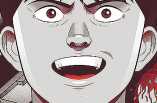

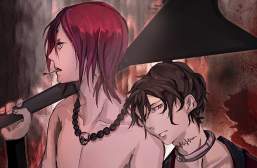
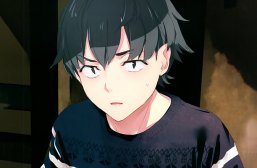
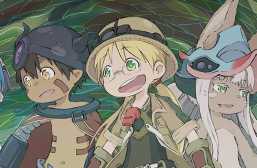
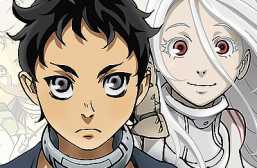
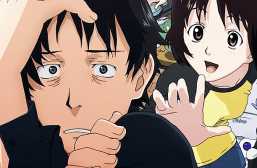
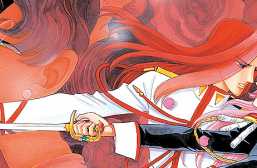
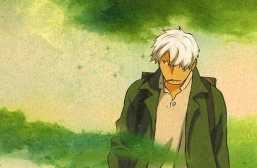
I thought MIA was great, especially the last episode. From my (western) feminist POV it’s nice to see a strong but not perfect female lead and many other similar characters. Many aspects that broke gender roles for both men and women.
That being said, not everything was great (true for pretty much all series though) and the occasional very much bordering sexual moments are rather disturbing considering the characters age.
There are many anime’s with female lead (not perfect too) like Claymore, Guardian of the Spirit but I think I might check this out.
Gosh, this sounds like a disappointing show to watch, narrative-wise. I know it was a beautiful show.
I like the interesting contrast between Riko and Reg’s personalities. Reg might be physically stronger, but he has absolutely no knowledge about the Abyss. And arguably he is emotionally weaker than Riko. His greatest fear is that if Riko dies, he would be left all alone and lose his purpose for living. I mean, he has no memories of his past, and it’s implied he has some connection with Lyza. Riko is his only connection with the material world. Riko on the other hand, has amazing willpower; her only goal is to get to the bottom of the Abyss and she’s willing to sacrifice anything to do so. In my opinion, that seems like a kind of role reversal for men and women in these types of stories, where the woman is totally dependent emotionally on the man.
We should’ve seen Riko taking on stronger roles and not as much cooking.
To be fair, both Reg and Nanachi *try* to cook at different points, and it looks as though Riko is the only one who can make anything that’s actually edible, so… One could argue that making her the best cook was a sexist decision on the author’s part, but if she *is* the best cook and doesn’t mind cooking, then having her take over that particular chore makes sense. (If only because she probably doesn’t want to get stuck eating any of the other stuff either.)
I think the most disturbing element of Made in Abyss for me was the sense of cosmic horror it leaves, rarely one gets to experience an anime where one can feel from the get go that the protagonists have literally no chance of survival. Just staring at the map of the Abyss one can appreciate how small and pathetic individual people are compared to this eldritch monstrosity, to the point white whistles could not even be considered humans by our standards, and even they would find it as madness delving into the deepest layer. For me Made in Abyss is a tale of how small humanity is compared to the things we cannot understand, and that sacrifices will have to be made if we want to stare at the light of that knowledge. Or in this case, the absolute darkness of it.
Wonderful article that made me think about a few things that I didn’t before.
Made in Abyss… the author admitted in an old interview that he was partly drawing his fetish.
I suspected as much. I will say that, as far as stories created to pander to fetishes go, this one is better than most. The anime might have something to do with this, since it’s better and more tasteful than the manga in many respects, which often happens (I discussed this in more depth in my analysis of the “Deadman Wonderland” anime).
Curious about this. Would you be able to help me to find the interview? Having difficulty.
I’m an avid reader of your articles. The cosmic horror one is my favorite, but this one is a very close second.
Made in Abyss is an undeniably good show, and legitimately a mixed bag from a feminist perspective.
On one hand, Riko is a great protagonist. She’s energetic, curious, resourceful, and full of determination. She is a character with a unique, engaging personality who drives the story instead of having things happen to her, which is exactly what a lot of feminists want in a protagonist.
On the other hand, the show has a lot of scenes with naked kids. Usually Riko.
Even reg is shown naked at times particularly he is always topless and his genitals are a used repeatedly as a joke in regards to their existence.
The story is basically telling us that neither of the characters were physically, emotionally, or mentally prepared for what they have come across so far. Even if Riko were a boy, the same thing would have happened in the end.
I’m not convinced how much Abyss is a show about accomplishments, or heroism.
It’s a story about the best and worst aspects of human nature in the harshest possible environment. In that regard, I don’t think the author really cares much about the gender aspect. The fact that two of the most powerful characters in this show are women (and that it is so normalised in the setting of the show) is already pretty cool to me, but the show goes further in getting us to question their humanity. Delving down into the Abyss is not just a quest of adventuring but also testing the real limits of the human spirit.
I have to agree. I expect many things from Riko. i think there is a lot of room and potential for her to grow. And she can possibly become more powerful but probably at some great cost which is what this show has been doing anyway.
Riko’s “I want to catch up with my mom” line was one of the most notable moments of any premiere that I’ve seen yet. A female character being inspired by a mother figure? Maybe I need to watch more shojo/josei, but I feel like that’s a motivation that we very, very rarely see – not just in anime, but in anything. Hunter x Hunter is probably the poster child for that particular dynamic (Gon and Ging) and I know I’ve seen other version of it (son/father, daughter/father, even). But daughter/mother? I can’t recall the last time I ever saw that, and I think that’s kind of special.
I immediately thought of Haruhi in Ouran wanting to be a lawyer like her mom, or Maka in Soul Eater admiring her mother – but you’re right, it’s a pretty rare inspiration, even in shojo, and it’s really nice to see more of it here.
An older example I saw recently is Fruits Basket. I’ve only seen the anime, but it was made quite clear that Tohru’s vibrant mother was both sorely missed (she died before the first episode) and also a source of inspiration for Tohru. Kiki’s mom is a source of inspiration in Kiki’s Delivery Service and is alive as a bonus, even if K has to leave home for a time.
Mitchiko & Hatchin might be a candidate, but Hatchin’s inspriation comes slowly over the course of the story. She’s mostly annoyed at her Mom. 🙂
I just watched this yesterday with a friend and we were FREAKING out when Riko got injured. We made jokes of “ha betcha they are all gonna die in the end” because people always say when your favourite character dies it’s the worst… but nope. Made in Abyss found something even more heartbreaking than just having a favourite character die… watching them horrifically suffer… for me the sights of things weren’t so horrible, but those voice actors were so brilliant and the screams shook me the hell up. Needless to say we are seriously looking forward to season 2.
I think the reason the show made me feel weird, even though I really loved it, was because the questionable scenes kind of feel like they’re made for people with a fetish for truly innocent children, and specifically for seeing innocent children suffer. All of it is thematically understandable, because it’s written really well, but it still kind of feels like only someone who enjoys imagining these things would write them this way.
The manga is far more unforgivable about this whole issue. It blatantly exposes the reader to these young characters in unnecessarily sexual situations and at many points it sets up the reader to make uncomfortable assumptions about the situation they are in. Spoiler: there are multiple points in the manga (past where the anime left off) where Reg and Riko get groped and felt up by narehate. Rico gets a weird tentacle in her mouth while creepy creatures pull down her apron (nothing underneath either, just a whole lot of uncensored nipples), Reg gets a tentacle put in his pants, a narehate sniffs his penis and then puts her whole face in his pants and he clearly doesn’t like it. And while they have these things happening, you get the classic hentai face expressions of drooling, sweating, and hot breath. The manga doesn’t censor them like the anime does, and while Riko is basically undeveloped, there are other side characters who are still young-but are way more developed and just as exposed. Having naked child characters isn’t really the issue, its the way their bodies are sexualized that is problematic. Like theres a character Rikos age with far bigger breasts and she’s naked and squeezing them for zero reason. Theres a picture in the manga (maybe chapter 47) where you see Riko and Reg next to each other and both are shirtless, but Riko is in the front and her chest is…very exposed. And she’s a kid-shes allowed to have that disregard, naturally. However, in the next panel, an older female character basically says “those kids don’t wear a lot of clothes…I wonder what kind of relationship they have” and she drools over the idea that these two innocent, uncaring, half naked chilren might have a x relationship.
That’s a very judgemental way of looking at things, and the problem with that is that you are essentially projecting and it tells more about what your mindset would be for drawing those scenes instead of what the creator intended. You shouldn’t read any dark fantasy if that is the case.
To be fair, Snowflakes like Freita or the author of this “essay” shouldn’t read anything except the brainfarts from within their own little circle. They simply can’t handle anything that supports their narrow views 100%.
MIA is a fantastic manga (I don’t watch anime). I even would call it unique. There are some traditional manga elements that Western snowflakes won’t understand. Just stop reading manga/watching anime if it upsets you so much. You will not change Japanese culture. Luckily.
This anime is sooooo heartbreaking you wouldn’t expect a world this beautiful to be this dark.
Made in Abyss is something that Lovecraft would think of if he was given a chance to make his own anime series.
I tried reading the manga of made in abyss (actually pretty blind- I had an inkling it got a bit mess up, but nothing about to what extent, how early or the frequent sexual references involving kids), and like i dunno maybe it’s just because i’m a prude and a little oversensitive to the topic of paedophilia but i really disliked the frequent nudity in made in abyss, i felt like someone (not even necessarily the author/artist) was getting off there and it made me as you said very uncomfortable. It made me uncomfortable to the point where I didn’t want to continue after volume 2, which is a shame because I felt the dark fantasy, no warm fuzzies, the world and most things in it are malevolent and will hurt you in every way really, really engaging but then when it got to someone fondling reg’s roboballs again i felt dirty and didn’t want to continue.
In fairness, the anime’s a little bit better in this regard than the manga. The nudity and sexual content are still there in the anime but somewhat less common and more downplayed. Of course, the anime so far only covers about the first 3 volumes of the manga, so whether that will remain true in subsequent seasons remains to be seen.
I think the issue about this whole nudity thing is familiarity and hitting too close to home. People can’t really relate to near death experiences and supernatural events. But something we can relate to is children going through puberty, because we’ve all been there. And child nudity is something we, on a societal level, regard as taboo. It’s an embarrassment. It’s the innocence that needs protecting.
Protecting innocence? Yet “we” want to take children away from parents who won’t “transgender” them?
Thank you – an extremely well-written and well-thought out post.
There are elements of nudity and Reg being the male protector, but I don’t think it negatively affects the show or the narrative. The entire theme of the show is survival and being cast into a more primitive, cruel world. This is going to result in nudity.
Riko only has one pair of clothing (or at least not many) and the world is so dangerous and lethal that little scraps of clothing can easily be torn to pieces. When you think about humans in the past, we were mostly naked or did not wear much clothing. I think that the nudity helps give a more realistic and raw feeling to the show. They obviously don’t HAVE to include it. Only once or twice would have gotten the point across. At the same time, they aren’t sexualizing Riko. She isn’t drawn in a sexual manner nor is anything ever really shown.
I see your point, but I feel like this is more true of the anime than the manga. The nudity and such are a little more subtle and tasteful in the anime, whereas the manga contains some details that I would argue go too far even given the brutality of the world (such as a side comment in Volume 1 about whether Riko’s male best friends peek on her when she’s strung up naked, and I also saw a sneak preview of Volume 8 that features a random scene of naked women making out for no apparent reason). So that’s what I find troubling, moreso than the simple fact that the characters sometimes get naked.
I feel like anime should try to make the children characters look younger. Another problem I have with children characters is that they don’t look as young as they should beyond their body. They shouldn’t give them an attractive face and sexualize them. Same with adult characters and it being “cute” that they look like teenage characters.
I don’t mind it in something where the point is to look moe and it’s just a comedy, but when you watch a romance and the female character looks a decade younger than the male character she winds up dating, despite the two being the same age apparently, it doesn’t look right.
I found the nudity suspect. In many cases, there were narrative reasons, and in no case was it ever explicit (thankfully), but on the other hand, many times it weren’t neccessary, especially not showing the audience. I almost stopped watching the series after Habbo’s “inspection” of Regu’s goods, but I decided to power on through regardless. Far too many times did I have to force myself to keep watching an otherwise splendid series.
Well, in it’s defense, I have heard people say that it adds to the series raw feeling, nothing is sacred or taboo, all the horrible things you will be shown, no tasteful cuts to spare your soul. And I can partly agree with that, in the cases where the nudity was a result of injury or medical aid. But the bathing scenes or straight up bondage scenes weren’t really conveying that feeling to me.
i agree with you, it´s a bit unecessary (in the manga it´s a bit worse because less sencure), but show me an anime with any bit of fanservice excluding anime made for kids and merchandise (even moe{shit} has it´s own particular kind of fanservice) so it´s not so bad(still bad)
One thing of note about Bonedrewd: he is sooo interesting as a character specifically because of the ways in which he is both dehumanized and simultaneously humanized in the story.
Bonedrewd is an absolute monster. We all know that he’s a monster. And as a villain, he’s almost comically over the top. He’s the most trite, cliche hive-minded-nazi-symbolism- scientist-experimenting-on-children- wearing-ominous-mask-subarashii character you can imagine. He is absolutely irredeemable in every conceivable way and yet manages to be foreboding and interesting because of a single trait- his genuine love for Prushka.
Bonedrewd does not understand what humanity is. Part of it is Zoaholic, but I believe he never really had the full grasp of the concept to begin with. And yet it is clear to the viewers that he genuinely cares about his daughter. He refers to the cartridges as girls and when he turns Prushka into one, he calls her by name. He calls the blobs by names as well. He is keenly aware of who every single one of them is. He says that Srajo and Wakuna, the two other White Whistles, left for the Abyss “selfishly”. That word is important. Bonedrewd wants to go there to. He’s a White Whistle after all, he wants nothing more than to go on an adventure. In a horrifically twisted way… He wants the same thing the protagonist Riko wants. Except he can’t go, because he’s a scientist, he has a duty to figure out the Curse. He wants to make sure that not only he can go, but everybody can share this marvelous experience as well. He is ultimately motivated by compassion, as any scientist would be. He sacrifices himself to become a White Whistle. He demands nothing from others that he did not give himself.
And in that final fight with Reg, THAT is his adventure- he got to analyze a great relic of the Abyss, he got to journey with his beloved daughter, he witnessed pain and love, desperation and determination, he got it all. That fight is powerful because in the end… Bonedrewd wins. He gets his wish. Only Bonedrwd realizes in that moment that in doing so, he to loses everything he actually cared for- his daughter. When he sees the party off to the entrance to the 6th layers, his eye is empty and defeated. His ambition is crushed. It’s saying the same thing Nanachi once said: I have found my great treasure of the Abyss. Please do not take it away from me.
There is a part, a tiiiiiny sliver of Bonedrewd, that understands the loss. He can no longer see humanity as intrinsic, but never the less, he experiences the pain of someone who lost everything they cherished.
Bonedrwd as a character is so powerful because he suffers to. Which is true for all the characters in Made in Abyss. It is through their suffering that we learn to care about them. This sweet pain of empathy is uniform and even a monster such as Bonedrewd evokes it in the most uncanny way.
Rant over.
Bondrewd is one of the most fascinating villains of any media. I was disappointed to see the anime end right before the camp of the praying hands. The anime wouldn’t have suffered from 4, 5 more episodes story wise. Would have tied a nice bow around the bondrewd-arc and ended the anime at a nice time, before going down to lvl 6 and upf*ck-town
Bonefred actually care and seems to even love the children. In the manga, when confronted with the transformed children again, he resites all the children’s names in site. This begs the question why would anyone go to the effort to remember a lab rats names, the most apparent answer is he had some feelings for it. This realization doesnt take away from MiB but adds to it. Love is regarded as the the strongest emotion people poccess, sometime as a weapon, but the insanity, brought about about from either the Abyss curse or desire for exploration/knowledge, is stronger. Having insanity and being totally removed from humanity is understandable, they are monsters, beasts ghouls or whatrever, but processing both insanity and humanity is more terrifying. The Abyss can change people far worse than the monsters in it.
I really love Made in Abyss, but a few of these situations were so weird. I found myself always thinking “paws off Regu’s pants!” ^^”
The shower scene with Riko… I saw this scene more as a vulnerable state for her.
The little last joke between Regu and Riko was also in the “that’s okay”-spectrum to me, because at the age of 11, 12, you can already have serious crushes and fell for people etc., and we didn’t see anything when Riko said “hey, what do you have there?” (or something like that).
But I haven’t read any farther yet and I already spoilered myself that there maybe could be some irksome things for me.
On the other hand, I really appreciate that the author portrays the medical aspects as disgusting and very painful. I read a few times that other people saw it as “torture porn”, but I thought it to be very realistic. I see where they are coming from, tho realistic medicine can also be very disgusting and (body-)horror-like.
The Abyss feels like this beautiful unexplored jungle that is better off unknown for the sake of one’s sanity. Explorers will find priceless treasures and powers, but it will cost everything they have, and the relics will degrade their humanity. This is why Riko’s childishly pure yet professional perspective is such a breath of fresh air to this concept. She has a simple and easily identifiable goal, and she will never give up on it for solid reasons. This is why we’re all in for the ride and having high hopes for how will this story end. Made in Abyss’s story is just like the abyss itself; the more you know, you get horrified of what you find, but you just never give up on watching it because confident plot of the story is telling you that it’s going somewhere, and you can’t help but to get dragged in.
Honestly, hild sexual fantasy or lolcon is the first thing that makes me sick about Japan. As a person who is a anime lover, has visited this beautiful country, has so much respect to it back then. I have to admit that I hate sexual fantasy in anime/manga to the bone/blood, it is the first and only reason why it’s hard for me to tell openly that I am an anime lover.
It’s important to remember that while there are some anime that sexualize children, it’s far from universal. I’ve seen many, many beautiful and well-written anime that never sexualize children (or anyone) at all and have very important life lessons. Nor is the sexualization of children a problem unique to Japan–there’s plenty of child pornography in the Western world too, but we don’t know as much about it because it’s more likely to appear in contexts specifically catering to porn users (and then of course there are Western works like Fifty Shades of Gray, which are blatantly sexual and often violent as well). As far as I can tell, most Japanese don’t like child pornography either–they’re just more likely than we are in the West to acknowledge its existence.
The reason that I so thoroughly enjoyed this was because we followed the journey of the characters. When you go to a horror movie, you go into it expecting a horror movie and as such you’re fairly well mentally prepared. I went into this blind, and in the same way that Riko naively looked into the abyss as a realm of mystery and adventure, I looked upon this as a nice anime and something that was gonna be just an interesting nice story. Then, as the innocence of the story started to drain out I started to have that foreboding that something genuinely wasn’t quite right about this, and it all climaxed right around the amputation part. Was a genuinely riveting story through and through and it was mesmerizing to genuinely feel the same things you’d imagine the characters feel.
The way I look at Made in Abyss is that it’s basically a manga/anime version of something Stephen King would write. If you’ve only seen the movie version of It, perhaps steer away from the novel because the depictions of childhood sexuality go far and beyond anything seen here. And it’s even more pronounced because you don’t have the barrier of it being a alternate version of our world with different laws and rules and culture; It takes place in our world, just at an unseen part of it.
But functionally, it provides the same purpose. You are being told constantly that NOTHING is held back in this work of fiction. Nothing is sacred. Nothing is off-limits. This is a manga/anime where children are being mutilated and tortured and vivisected, but a pubescent girl’s bare chest being exposed is the most scandalous and terrible thing? I feel this is an entirely American delusion, where violence is normalized and sex is taboo. Many people are making use of the term “sexualization” of the children, but that is wrong. The children are sexual, not sexualized. There is an important difference. They are not portrayed in a way as to make them sexually act or appear like adults; they are portrayed in a way as to make them sexually act and appear as 12-year-olds. The author has a bizarre fascination with making this as precise as possible, but it’s not an unrealistic portrayal. It’s just that some people like to pretend as if children are innocent until age 16/18, or at the very least don’t want to be reminded that this is not the case. The point is, that’s cold and pure reality, and cold and pure is what this manga/anime are made to be.
A note: Marulk a most probably a cis male who is implied to have been forced to dress that way by Ozen. You have to read some supplementary material from the main manga, and then “read between the lines”, but there is nothing aside from the manner of dress that suggests Marulk wants to be a girl. While usually polite and demure, he DOES make the choice to defy Ozen’s order and fetch some other adults while Ozen was beating up Reg – a “dominant” and therefore male characteristic. We don’t know why Ozen wants him dressed this way, as a replacement for Lyza? (who Ozen possibly had some romantic feelings for, judging from her horrified reaction when Lyza introduced her new husband) or a replacement for a daughter (perhaps where her own white whistle came from?), or just for her own amusement? But it’s certainly interesting to see that all it takes for an intelligent person to mistake someone as trans, is for them to dress as the other gender, when not being aware of the full context.
Also: the author said in an interview that Prushka’s infamous mention of a “papa pole” was actually from learning biology/zoology. It’s a mistranslation; it’s supposed to mean more like “the pole that a creature uses to become a papa”. The idea that Bondrewd even has the capability of sexuality, toward anyone (or, indeed, if any of his heavily-modified bodies has a penis to begin with, because what does he need it for?), is frankly a little bit absurd.
I suspect the author did not read the most recent chapters. Because otherwise I cannot understand the omission of some of the most prominent female characters of the manga. Vueko: a crucial member of the team that discovered the Abyss and founded the Hollow Village; Irumyuui: a young native girl who, after a fashion, BECAME the Village; and Faputa: the final “child” of Irumyuui who seeks to kill all the Hollows as a revenge for her “mother”, and is of strength far beyond anything we’ve seen in the series so far – a true “force of nature”. I would be interested to see the author’s interpretation of them, and how they fit into the overall narrative. There’s a lot to unpack there, and I could talk about it for hours.
It’s certainly an in-depth reading, but not one that I would really personally put much weight in. A reading of this work from a feminist perspective is cool, but it seems to me like the author exclusively wanted to come out of it with a negative perspective, thus ignoring large chunks of the story and context that would contradict that view.
The big thing is that the author of the article seems to read human bodies being modified and not treated well exclusively as representative of gender reassignment surgery, and their only real material to support this claim is that the series has several gender-neutral characters. This just ignores the fact that gender neutral characters are really common in anime and manga.
The reading I’ve always gone with is that the lack of respect shown for human bodies is more meant to be about dehumanization in general, and how people objectify others in order to exploit them as resources.
Big obvious examples:
Orphanage just yeets children into the death pit for profit
Bondrewd murders children in order to study the abyss
White whistles are literally humans made commodities
Ilblu village was created by a turning an innocent girl into a baby factory and then eating all her babies.
Hollows literally use human bodies as currency
Faputa is blindly worshipped by the Hollows as a goddess as a means of shrugging off their personal culpability in her and her mother’s suffering
I mean, how can you read the backstory to Ilblu in anything other than a pro-women’s rights light? With some of these points I can kinda understand where the author is coming from, like if you removed all context from Bondrewd turning children into something weird, yeah I guess that could be an abusive parent forcing gender reassignment surgery on their children, but when you add back the context that he bought a boatload of orphans and is yeeting them into the death pit for science and profit, it becomes extremely clear that the series is meant to shame exploitative industry.
To me, MiA is an analogue to children being sent to mine coal at 7 years old, and how power structures like capitalism always inevitably result in the powerful dehumanizing the weak.
This series seems to be a cross between Jules Verne’s “Journey to the Center of the Earth” and Dante’s “Inferno.” The mystery of the Abyss as well as the main characters’ plots make for some of the best storytelling from an anime series that I’ve seen in awhile. It’s too bad they revealed Bondrewd so early, though. He seemed to be an excellent protagonist. I can only imagine how terrible the next protagonist will be.
Made in Abyss is one of the most fascinating pieces of work I have seen and read the past years. I honestly adore this article, it’s awesome and includes very well thought-out points that are put into an entertaining format. Kudos to you! I applaud this, for what it’s worth.
Controversial opinion, but, it always kind of made sense to me in Made in Abyss since it depicts a world where everything, including adults, presents a threat to children. There’s an abundance of orphans due to the dangerous nature of delving and they’re kept in a kind of indentured servitude where they have to find relics and bring them back to the orphanage in order to earn their keep. So it’s relevant that the adults treat the kids like they have no dignity or value.
Thank you for sharing your thoughts. I enjoyed your(?) piece about traps in Anime and Manga back then, thanks to it I got to know who Hideyoshi Kinoshita is.
This piece however… let me phrase it in a metaphorical way: For a hammer, every problem looks like a nail. I’ll try to rephrase catch phrases:
In the story a small, frail girl is physically just that – a small frail girl, and if she uses a strong robot with a male physis and a (presumeably) male soul, this emphasizes traditional gender roles and is deemed traditionalist? Well, the problem is – this Abyss is about the (accelerated) cycle of souls, and Reg seems to be a “container” for souls from deep inside the Abyss, which contained quite a number of souls already much earlier. These older souls sometimes surface in his mind in critical moments. It’s not known, what soul actually resides in the male hull that is Reg. Some redditors suggest, that it may be Riko’s dog. (!) I’d like to add the Gedankenexperiment, that it may even be a female soul which is “trapped” in Reg’s male body, which would explain her embarassement when she experiences a boner first-hand for the first time in her life. Bam, there goes your argument up in smoke, unless you already know for sure whose soul is contained in Reg’s body and what gender it claims. I don’t.
Secondly, Ozen and Lyza are the opposite of Riko and distinctively non-traditionalist in the sense that they can stand in for themselves in physical conflicts. Here you imply that they are written that way because women in modern society are to perform like men… Now, I’d like to add Faputa to the discussion, who is a girl as well and who is the most potent being in the part of the Abyss known by us. There you have it – the full spectrum of physical ability, all in girls and women, which imho shows only one thing for sure: Gender doesn’t matter in this respect. However, you manage to project this into a proof, that all this can only be written with an overpowering masculinity in mind. It’s your mind projecting this.
For Marulk in a way the same holds true as for Reg: We don’t know, who (s)he is, why (s)he is dressed as a maid and how (s)he came to be the servant of Ozen. Since (s)he has eye discomfort like Riko, we may assume that (s)he was revived by Ozen’s cube after his/her “accident”, but we don’t know, who (s)he was before. We don’t even know whether (s)he just wanted to be a boy like Reg (whom he chats with easily like from boy to boy during their stay), but is prohibited from by Ozen and/or circumstances (like he is sought after by assassins, because he is a heir to an important family?). We don’t know anything about his and Ozen’s past, and anything you write about her tortured soul is… a projection again.
Finally (didn’t want to write an article myself, but found me doin’ it) Nanachi: The bun has had just one mission: How to care for the end(!) of their one and only precious somebody they ever found in their entire life. Trying and failing and causing seemingly neverending pain to their most valued friend over years and years – it is a miracle how they managed to stay sane. How one can speak about their vulnerability, confusion and lack of empowerment due to them not having a defined gender instead is beyond my understanding.
Don’t get me wrong: I still enjoyed your piece, as it shows to me how different other people’s brains function with respect to mine, and I am ever in to learn. You should be careful though – Tsukushi-sensei is usually quite ambiguous about his characters and their development. So people may come out with their projections onto the established canon, and this may reveal waaaay more about themselves than about the author. Especially, if the objected characters prove to be of the opposite gender than projected, later…
One additional point I feel it’s important to mention. Everyone up-in-arms over the naked-hanging is viewing it completely wrong. True, in our culture such a thing would be odd and inappropriate, but Made in Abyss does not take place in our world. In-universe, it is a punishment, not anything sexual. The nudity is for the purposes of humiliation, and it can be surmised that the hanging part is because it’s at least uncomfortable and likely painful. As a punishment, it functions perfectly as a deterrent; children are at least hesitant to repeat the actions that caused them to be punished.
However, the most critical point is that a punishment for children that combines the humiliation of nudity with physical pain DOES EXIST in our culture: bare-bottom spanking. While this has mostly fallen out of vogue in the last couple decades, it did happen, and with frequency enough to become a cultural staple in fiction and artwork set in that time. Not too long ago, a misbehaving child would have been directed to drop their shorts and underwear, bend over the lap of a parental figure, and be spanked. Often, this would take place in public and in full view of other family members and complete strangers. Their genitals would have been visible.
If you’re not willing to accept that spanking in our world is sexual, then you must accept that the naked hanging in Made in Abyss is not, either.
um…no? you are reaching to a near unbelivable extent, the sheer level of nonsense here is so much of a pain to pick through and you are hurting the cause with this kinda dross. now the mangaka may very well be a backwards thinking fool, but if he is it doesn’t actually shine through into the work at all.
just a few of the obvious things that stick out to me;
going feral isn’t the abyss rewarding masculinity, thats a stupid idea. if anything you could say it is rewarding a loss of humanity. oh, and cutting your hair short isn’t masculine unless you are 1600s christian level regressive and its just a generally good practice if you are doing a lot of physical work in a deadly environment (like the abyss)
reg’s masculinity isn’t some major focus, he is always reduced to a blubbering wreak and his humanity is what is constantly pointed out.
cooking isn’t an innately feminine thing that only women do, men have to eat too and they have to cook food to do it. nanachi isn’t more feminine just because she cooks, she _has_ to eat and she lives alone, what else is she supposed to do? hell, the fact that she can’t cook for shit should imply more masculine things in your view.
mitty and nanachi’s relationship is friendly, they are friends. you would be pushing it a bit to imply they were crushing on each other based on what we see. nanachi clearly just blames herself for mitty’s suffering and wanted to set her first and only friend free.
riko isn’t some pure baby, she understands sex, she just explicitly (and i do mean explicitly, pretty sure she out right says it at one point early on) doesn’t see reg as a living person with his own autonomy and sexuality.
the nudity is to show the world is a fucked up place and that children often have their dignity and autonomy stripped from them.
i don’t remember lyza being forced to go diving while pregnant, she was doing the one thing she really loves, and abandoning her child isn’t some deep message about parenthood and gender.
ozen may just be projecting her femininity in a weird way; through marulk. his gender identity isn’t explored much at all, and he is left ambiguous as to both his gender and sex (heavily implied to be biologically male, at least).
there are probably more things that someone more interested could call you out on too. you very clearly went into this with a specific outcome in mind and you forced your personal favorite social issue onto something that doesn’t touch on it at all. if you want to read more into mia it looks more like an anti-capitalist message, about how our culture sees humans as little more than a product to use and abuse, either for profit (the orphanage kids), for scientific progress (bonedrewd), or for someone else’s personal pleasure (ozen)
Exactly. People have an agenda and make it their life’s purpose to shove it on other people and ruin literally everything. Luckily anime is Japanese and they don’t give a shit about western whining.
Usually animes don’t really get me to go and fetch their source materials, but Made in Abyss was different, too interesting to pass up the manga, and I am glad I didn’t ignored it as it was insanely awesome.
My friend recommended me this anime and I jumoed right in whrn she sbowed me the characters. I was like “Wow a fantasy anime withe beautiful art and adorable characters? Thank you!” And then a week later Im sobbing into my pillow because of the absolute torture my heart was put through.
Okay, here is something I want to address because it’s come up in a couple of comments now. There’s a reason why I didn’t include anything from the most recent manga volume: namely, at the time I was writing this there had been no official English translation (or at least none that I was aware of). I’m not the kind of person who hunts down scanlations of something when I know that there’s going to be an official English release eventually, so I had to ignore the later volume and base my analysis on the portions of story I had already seen. I’ve seen snippets of it on YouTube (from which I can gather that it really doubles down on the concept of corrupt adults treating children as commodities), but I was never going to include it in this article without reading the official English release first.
@Debs: As a supporter I buy both manga and blu-rays as soon as they are available. That doesn’t stop me from using fan-made scanlations in order to be able to discuss recent chapters online, which for me is an essential part of the fun and inspiration I have with his works.
I just feel like people are putting to many real world ideals into a fictional land where things don’t at all work like they do here.
Just be thankful the animators of Made in Abyss tuned the sexuality way down from the manga.
right? i was repulsed when i first read the manga, im starting to think majority of the moments are just the author being a borderline p3d0
Thematically, the sexuality of the situation makes sense cause it’s used to demonstrate how Reg isn’t seen as a human in the situations, but it’s just so appalling to people on the first watch that it’s quite hard to recommend to someone.
Let’s be real, if you’re recommending Made In Abyss to someone, then that was probably your goal to begin with.
Kinda ridiculous the extent you get into this manga as anti-feminist text. Clearly you haven’t read enough manga or understand the Japanese genre enough.
I see Bouduredo as a monster who is a manifestation of the Abyss itself, in a way. Something that was once a man, but who was consumed by the Abyss and became just another form of its menaces and horrors.
This is a well researched and well cited write up. Thank you for the time and effort that you put into it.
This having been said, I also think that some consideration needs to be given to an alternate perspective. MIA absolutely has some problems, *particularly* with the sexualization of children and the sexual violence inflicted on them.
But I also think that it’s important not to throw the baby out with the bathwater here. Particularly in the case of Nanachi. You accuse the writers of MIA of having conservative, anti LGBT values, then immediately turn around and invalidate the character’s chosen gender. I appreciate that you used “they/them” pronouns through the article, but you also insist that their presentation as nongendered implies that they are somehow at odds with inner lesbian feelings. Not only does this contradict the story (in which they go by nonbinary pronouns since before having met Riko), but it also pathologizes their gender. Those of us who are nonbinary are pretty used to this, but it does not reduce its sting, particularly when coming from someone who seems like they might otherwise be an ally. Being nonbinary is NOT confusion over whether you are male or female as you very bluntly speculate in your article. And it is not simply a reaction to personal sexuality. If this were the case, there would be no gay men or women. Just a third gender. Gender and sexuality are independent of one another. The idea that Nanachi needs to have their gender “explained” to them is downright offensive. I cannot imagine a more profoundly infantilizing way to think about another person’s identity. That Nanachi experienced trauma does not somehow strip them of their right to express themselves how they choose to. The insistence that their “real” gender carries the weighty implication that nonbinary is simply not legitimate as a gender presentation.
Additionally, I feel as though your article itself stresses as a negative women acting in traditionally male roles. In particular, your quote from Primal Screams, which seems to imply that it is right for women to need male protection, that men are obligated to protect women, and that for one woman to protect another is somehow unnatural. That is the same gender essentialism that you accuse MIA of in your article.
Last… MIA does not make a direct correlation between the desire of trans people to modify their bodies and eroticism. You do. I know you are looking for anti feminist patterns in the series, but do not look so hard that you start generating them, yourself.
There are absolutely some upsetting things in Made in Abyss, but that does not mean that there cannot be value to elements that are simply adjacent. Again, I enjoyed your article, and I think it is very important to shine the cleansing light of feminist perspectice into the dark corners of anime culture. But I think it’s also important to keep from *contributing* to those dark corners.
Thank you for reading this entire comment if you made it to the bottom here.
An interesting essay. I remember buying manga books for my children, more than a decade ago. I know none were covering issues such as in this essay. Perceptive tying the books and anime to a court case in Texas.
This made me rethink the series in a way I hadn’t thought about before. I watched the show a while back, so I can’t say I remember everything about it, but from what I can recall, I did find the sexual implications as well as the graphic scenes of suffering and pain to be very uncomfortable. However, I also found that to be the series’ strong point, to be able to handle those scenarios in a way that many other anime could not. That said, someone in the comments also mentioned how the author/creator was simply trying to play out their fetishes, which has now made me reconsider my entire position on the series. I would like to see how the anime handles the content from the manga in the upcoming season though.
Good analysis, but the LGBT metaphor seems like a stretch. If anything, the Abyss seems to represent the heteropatriarchy more than any sort of deviant gays/transgenders or whatever.
This is literally the biggest stretch I have ever seen, once traditional femininity is bad, then not. Ignoring such premises as REG BEING A HUMAN-LIKE ROBOT, him having his humanity represented by his sex drive while not being treated as human being. The traditional female characteristics: cooking, empathy and love being represented as highly valuable and the bad things: hysterism, hyperemotionality being shown through REG. NANACHI BEING ADDRESSED AS THEY BEFORE THEY WERE BLESSED. Lyza literally abandoning her mission in order to save her daughter that she loves more than anything, LEAVING BEHIND THE BODY OF HER LOVER JUST TO BRING THE C O R P S E OF HER DAUGHTER BACK TO THE OARTH.
I just- I don’t have the energy to address all the bullshit in this.
It was clearly made with an idea in mind and then the author read the actual manga. I cannot even.
I really love this series. I found Riko’s obsession with the Reg penis to be interesting as it’s usually the male characters in anime that are perverted. In the latest movie, I found Prushka breasts to be too sexualized.
I like how this article deconstructs Made in Abyss, showing how it has a feminist veneer but actually is just like any other anime by putting characters into traditional gender roles. I haven’t watched this series, but if I do, I’ll keep this article in mind when watching it. Some have made hostile or negative comments, but I actually think this author makes a compelling case.
Maybe watch the show before you say that then? The author clearly has read made in abyss, but as a long time fan of made in abyss myself, I find that the actual show/manga lines up much more with a message about capitalism rather than an anti lgbt agenda. Pretty much the entire excerpt about Bondrewd is debunked by just watching the movie/reading the idofront arc.
I think most people just see a fantastic and dangerous world to explore. A world that pulls no punches to if you are innocent or guilty. A world with fascinating characters whoe have all lost to its dangers one way nor another. I dont think everything has to have some hidden political meaning and to be honest it would be better for more stuff had less intrusive agenda drive politics jammed in it.
Some things you got wrong:
Marulk isn’t trans, he’s a guy, he has this disease where he can’t come in contact with sunlight for too long, which is why he can’t return to the surface, and also why he wears that dress. It’s supposed to be a type of clothing people with that disease wear in his culture to protect from the sun, though in his case ozen’s modified it to look more like a maid outfit.
Bondrewd never sexually abused Prushka, seeing that Bondrewd is all about science, he would want to teach Prushka about biology and medical science. The creator confirmed that the term papa pole is something prushka came up with herself, since it’s “the pole someone uses to become a papa”. Even without this info, Bondrewd really isn’t the type of person to sexually abuse his own daughter, I mean, he’s not even human, why would he have the desire to even have sex at the expense of traumatizing the one person who he’s supposed to get to love him unconditionally.
While you can certainly interpret the whole endless supply of children to be sent into the abyss thing as an anti LGBT thing, it clearly leans more towards the shady business practices that control our society. Especially with the very clear symbolism of the orphanage telling children to follow in their noble parents footsteps, ignoring the fact that their parents died because of delving. It has a very clear parallel to things that go on in our society. I think the whole thing about the white whistles fits in with my point better too, the white whistles are meant to represent the people who are glorified by the media and public, who only recognize someone’s glorious achievements and not the horrible things they had to do, and still do to achieve them. Bondrewd is the greatest embodiment of it all, a true leader, who will overcome any moral barrier in the name of progress, much like the billionaires of our modern day. Someone who will shut down any criticism by pure intimidation, and yet still remain loved by the people who see his exterior of power and leadership. He literally is capitalism and utilitarianism, and considering Tsukushi’s previous work as an artist for a video game company that he left to pursue his dreams, I’m sure he, like many japanese people, knows very well what it’s like to be trapped within an endless capitalist nightmare.
You wrote: “Bondrewd really isn’t the type of person to sexually abuse his own daughter, I mean, he’s not even human, why would he have the desire to even have sex at the expense of traumatizing the one person who he’s supposed to get to love him unconditionally.”
Prushka has had no references other than “Best Dad”. Literally ANY human-shaped body she has been interacting with in her past was Bondrewd. He could have told her anything, especially failing to mention all taboos which are in place in the outside world. He could say things like: Father and Daughter show their love even more while doing it – and stay undisputed. Again, there is no other moral instance than Bondrewd at Idofront. Anything goes.
Now, the act itself is a pleasant one, if stimulated in a proper way. So why would Prushka be traumatized again, if everything is just right and it’s sooo nice to do it?
Ergo: We cannot exclude this possibility.
This is utterly ridiculous that someone, anyone, wrote something this long to critique this wonderful anime in such a way. “It is clear, for instance, that Riko matters just as much to the story as Reg, but she still can’t escape from the limitations of her sex, and neither can he. Made in Abyss may look good to a feminist at first, but under the surface lurks a deep well of sexism and gender essentialism which is all the more surprising in such a slick, modern series.”
There are no limitations involving gender in this anime, unless someone wants to reach for them and create an issue that doesn’t exist. Feminists constantly search for things to find sexist, and it’s abhorrent. Even if this, or any other anime, did have female characters in traditionally female roles. What’s wrong with a female cooking and cleaning? What’s wrong with a man being a stronger character and saving a female he cares for strongly? Nothing is sexist unless someone is degrading a woman for being female. None of this occurs in Made in Abyss. Riko is portrayed as much more emotionally strong than Reg. She’s much smarter and can hold her own in the Abyss. He just happens to be a robot with super human strength. As far as her cooking, that’s another trait that makes her a more dominant character. They have to have food in order to survive. The world they live in is not modern western culture, and I’m fucking sick of feminists pushing their crazed, extremist beliefs on situations that don’t apply to their views. Get over yourself and quit ruining shit for everyone else.
You completely contradict yourself, as well. You dislike the fact that Riko has “traditionally female roles” such as needing protection and cooking. Yet, you also dislike the fact that Lyza is given many male characteristics and is driven to act like a male. So which is it? I thought acting like a female was distasteful to you feminists. You make no logical sense. You stated that women feel pressured to fill the types of job roles that men partake in, yet women bitch about how they don’t get respected in certain jobs, such as the military, construction, etc.
You then go on to say that Ozen is ashamed of suppressing her maternal instincts. If she lived in today’s society, I would say that feminists are to blame for that. Women traditionally take care of children, because that’s evolutionarily how humans operate. Yet, feminists try to go against the natural order of things because of some psychological issues that I will never understand. Yet, if Ozen was a character who stayed at an orphanage and took care of children, you would say the anime is sexist because it places her in a traditionally female role. 😂 I mean, how do you not see the blatant contradictions?
Women complain that they are not as respected as doctors as much as men. I have worked with both male and female doctors. I typically respect my male coworkers more. Why? Because they work six days a week, know the clients much better, and take their job more seriously, typically. They throw everything into their career. Most women I have worked with only work a few days a week, spending the other days with their children. And there’s absolutely nothing wrong with that. At the end of the day, happiness is key. But to be fully respected in a career, you have to be at the top of the field. Women are completely capable of that, and maybe more so than men. But you can’t have it both ways. According to your logic, if they work six days a week, and leave children with a caretaker most of the time, then they are trying too hard to act like a man. That’s insulting to women who WANT to dedicate most of their time to their work. You’re being sexist for assuming that they should act less masculine.
“If men cannot, or will not, be found to help protect women (and children), to whom does that task fall? The answer would seem to be, a woman–a woman who’s being more like a man, that is.” Here you are implying that men are failing in their duty to take care of women. But earlier you criticized the author for portraying Reg as the character who is always saving and protecting Riko. You make zero sense.
Then you go on to say that Nanachi is confused by her gender? Nanachi is confused because she turned into a fucking rabbit, is hunted by evil people, and is taking care of her best friend who turned into a blob, as she watched, in the most painful way possible. Also, why does it matter if Nanachi is a boy or a girl? Gender is never touched on at all in this anime. Romantic feelings between Nanachi and Mitty are DEFINITELY not mentioned at all. Nanachi loves Mitty because she is the only person that ever believed in her and wanted to be her friend. She’s had a shitty life, and Mitty became her treasure. It’s one of the sweetest friendships in all of anime, and you have to go and make it complicated by making things up.
“He also seems to care for at least some of the children, particularly Nanachi, in his own way, as is shown in a flashback where he says to Nanachi, “I wish you’d look happier.” Even after Nanachi steals Mitty away from him and orchestrates her death, he still welcomes them back with open arms and asks them to work for him again. More often than not, Bondrewd seems less malicious than oblivious, forging ahead in his goals without knowing or caring about the pain he inflicts on others.“ Bondrewd is one of the most evil villains in anime history. He doesn’t care about Nanachi. Are you serious? You’ve never watched a movie where a sociopath tells someone they wish they would smile more? He doesn’t ACTUALLY want her to be happy. He welcomes them back to work for him so that he can continue to do shitty, narcissistic and sociopathic evil things to them. To suggest that he has good intentions for wanting them to come work with him is utterly hilarious. Did you really watch the anime or read the manga?
Lastly, you quoted a psychologist who stated that having transgendered feelings is a psychological problem. I don’t agree that it is a problem, but to suggest that it isn’t psychological is equally as hilarious as my previous points. You can’t stand with a straight face that it is normal, any more than I can say having depression and anxiety is normal. There is a part of my brain that isn’t wired correctly, therefore making me this way. That doesn’t mean that I shouldn’t be accepted and loved with my mental health issues. Also, it shouldn’t be stigmatized. The same goes for transgendered people. Having to undergo hormonal therapy with medications, followed by surgery to remove your body parts is not natural. That’s just a fact. How someone perceives it determines whether they are tolerant or closed minded.
Certain themes mentioned in the article are in other anime.
What a stretch. And a misinformed one, at that.
Bondrewd never hurt Prushka sexually. the ‘word of god’ stated she learned the term “papa’s pole” from disecting animals, specifically the phrase a “pole that makes you a papa”. Bondrewd more then likey said it to try and explain male anatomy in a way she could understand.
Interesting read but the part where you claimed him to be a pedophile really rubbed me the wrong way.
As a big fan of the anime and manga and someone who’s reread and rewatches the series a few times, this is a pretty interesting view of the events and characters present throughout. I think some things like Reg showing off his masculinity in the form of mentions of his penis to being constantly shirtless may be also due to Tsukushi’s (the mangaka) rather odd fetishes when it comes to those subjects.
In terms of Bondrewd, I think it should have also been noted that he genuinely does care for the children that he leads to death. Even Prushka, a girl who he raised until her tragic death, was someone who he truly did love (https://pastebin.com/suLy0FN5).
I would have liked if you went more into more of the Sixth Layer and its many horrors, primarily Irumyuui’s obsession with becoming a mother.
If think you’re inventing problems by being so obsessed with defining everything along masculine/feminine lines. You don’t seem to be a fan of traditional gender roles and stereotypes, yet you reinforce them at every turn by using them as your basis for what is male/female. All forms of initiative, passion, anger, violence, drive and resolve are labeled masculine and being passive, demure, nurturing, calm, quiet and non-violent is labeled feminine. You’re pushing the traditonal values that you’re also having a problem with. You’re being your own worst enemy here.
I didn’t view the show through your kind of lens at all and just saw everything as character traits and expressions of the individual. Riko is a huge survivalism nerd, so of course she knows how to cook in the wild. Ozen is violent because she’s a sadist with a particular fascination for things that she can’t immediately break with her monstrous strength. Marulk is a nice and polite kid who comes from a culture where dresses seem to be unisex for children. Reg fights because he an indestructible robot with a built-in death ray, far better physically suited for that kinda stuff than Riko, but also far less mentally suited for it than she is. None of it has anything to do with the masculine/feminine as far as I’m concerned. It’s just about who the characters are.
Maybe you’d enjoy the characters more if you didn’t seem to have this obsessive need to categorize everything into male and female. Few things are inherently masculine or feminine, they are what we make them. Calling initiative, force, passion and the like masculine implies they’re not something inherent in women; An exception to the female, which is just bullshit. Same applies the other way as well.
Honestly, I don’t know how these people do it, but they always manage to reinforce to discrimination by reading too much into everything even though they’re fanatically against the idea.
love this article, i see nanachi and mitty as having romantic feeling for each other. although something that really throws me off with this series is the amount of borderline cp it contains in the manga.
oh just to add, if you do not agree with me on shipping nanachi and mitty that is fine, please don’t be rude about it i respect you seeing them as just friends.
I had never considered Nanachi’s gender, to be honest their personality naturally made me assume they were female, mind blown. I really adore this article and the character profiles included, while this anime has intended the purpose to show young girls being tomboyish yet feminine is most striking to me when viewing Riko’s character.
Interesting discussion of a problematic text.
The story is just the story. It is written to appeal to an audience. Usually, a cigar is just a cigar.
You are imagining – and manufacturing – all kinds of subtext where it doesn’t really exist.
I think this is overanalyzing and doubt that the writer has payed attention to the story.
1. Marulk isn’t trans. Ozen dresses him up as a girl because she wants to. In the new game “made in abyss binary star falling into darkness.” Jiruo seems to be suprised about Marulk appearance. In response Marulk seems to be embarrased and doesn’t provide any info. Ozen’s response is “doesn’t it look good?” as if she was responsible for her appereance. Also made in abyss fandom wiki states the following: “While the details are not clear, it is implied Ozen was the one that decided for him to dress like a maid.”
2. Nanachi’s gender doesn’t matter. She/he/itdoesntmatter became hollow before secondary gender characteristics around 12-years old. As a hollow, she might have lost her gender since in the anime “Made in Abyss: The Golden City of the Scorching Sun” episode 10 she is naked and seemingly doesn’t have any sex organs at all.
3. Bondrewd as a transgender activist? Where in the abyss did you manage to invent this theory? Bondrewd is just messed up in the head. He doesn’t promote sex characteristic change surgeries.
I hope someday people will stop creating messed up gender politics articles like this. It ruins series for some people and rewrite the stories as a vague political manifestations. Had I read this article while watching season 1, it would have ruined the whole series for me.
Skillful writing
“The only way to convince them that they are wrong is to understand and offer direct rebuttals of the arguments they make.”
So, it is already decided that we are “wrong”. That’s a really modern and liberal stance lol. No one has to accept your simulacra generated hyperreality as if it’s the natural order of the world. There are only two genders and one acceptable sexual orientation. Others are just deviant individuals who are mentally ill. That’s the reality no matter how much you try to reject it.